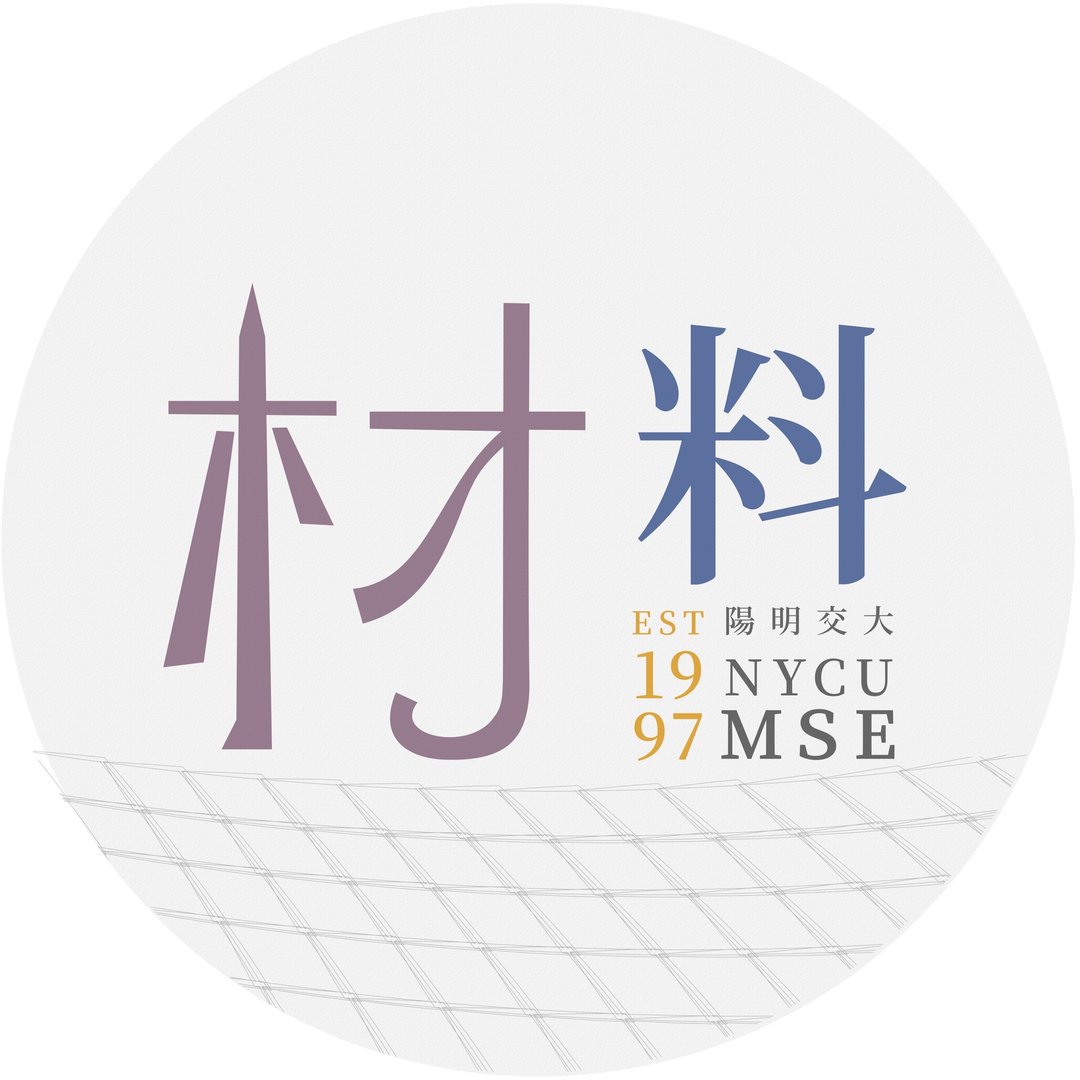National Yang Ming Chiao Tung University
Department of Materials Science and Engineering
Department of Materials Science
and Engineering


Introduction
Outstanding Faculty
The faculty members of the Department of Materials Science and Engineering at National Chiao Tung University are specialized in various scientific fields. They have received comprehensive and rigorous education and training, having graduated from prestigious institutions both domestically and internationally. In today's rapidly evolving scientific landscape and ever-changing industrial trends, our faculty is well-equipped to provide students with forward-thinking perspectives and broad, insightful scientific knowledge.
Cutting-Edge Research Facilities and World-Class Departmental Buildings
The Department of Materials Science and Engineering at NYCU possesses a wealth of valuable analytical and processing equipment, with over a hundred specialized instruments. The world-class materials science building, completed in 2005, provides students with extensive learning and application spaces, ensuring a successful educational journey.
Favorite Among High-Tech Industries
According to reports by CommonWealth Magazine, among the executives at the Hsinchu Science Park, including board chairs and general managers, 63.5% are alumni of National Chiao Tung University. Additionally, Chiao Tung University alumni account for approximately 80% of the publicly listed companies founded by Chinese Americans in Silicon Valley.
Outstanding Research Excellence
According to a report by the National Science Council, the Department of Materials Science and Engineering at National Chiao Tung University has ranked first nationwide in the impact factor of publications in international journals (SCI papers) over the past three years. This reflects that the quality of our department's published papers is the highest among all materials science departments in the country.
Close Integration with Academic Institutions
The Department of Materials Science and Engineering at NYCU has a close collaboration with the Advanced Materials Research Center at Chiao Tung University. Whether in the field of materials research or in interdisciplinary integration, the department consistently remains at the forefront compared to other institutions.
| Date 17/01/2024 | 國立陽明交通大學材料科學與工程學系誠徵助理教授以上之專任教師 | 有意應徵者,請參閱附件:國立陽明交通大學材料系徵聘教師公告113.10 |
Department Announcements
日期 17/01/2024
國立陽明交通大學材料科學與工程學系誠徵助理教授以上之專任教師
| Date 15/01/2025 | 【Scholarship】NYCU International Students Scholarships for the 2025 Fall semester application (till 12:00 noon, March 15th, 2025) To: NYCU International Students Scholarships for the 2025 Fall semester (award period September 2025 – August 2026) are now OPEN for APPLICATION! | 1. Eligibility:For students whose NYCU Scholarship... |
Department Announcements
日期 15/01/2025
【Scholarship】NYCU International Students Scholarships for the 2025 Fall semester application (till 12:00 noon, March 15th, 2025) To: NYCU International Students Scholarships for the 2025 Fall semester (award period September 2025 – August 2026) are now OPEN for APPLICATION!
1. Eligibility:
For students whose NYCU Scholarship award duration ends in August 2025 and maintain a total average grade of at least 3.5 for graduate students and at least 3.0 for undergraduate students.
The following situations are not eligible for the NYCU scholarship:
(1) Students currently receiving government-funded scholarships. For example, current NYCU scholarship recipients whose award duration includes the 2025 Fall semester, Taiwan Scholarships, ESP Scholarship, UST Scholarship, TIGP Scholarship, NSNT Scholarship, ICDF Scholarship, NYCU Elite Ph.D., a scholarship sponsored by the government of your home country…. etc.).
(2) Students holding a working VISA/ARC.
2. NYCU Scholarship Regulation (Latest version):
Please read the regulation carefully before applying for the NYCU scholarship.
3. NYCU International Student Scholarship Application System Link :
https://oia-scholarship.nycu.edu.tw/student
4. Application Duration: till 12:00 noon, March 15, 2025 (GMT+8)
We only accept the online application and please upload PDF files to the system.
Make sure to submit your application before the deadline.
Late submission will not be considered!
Please check the system and your mail regularly to confirm your application status.
If you are requested to resubmit any document, the email notice will be sent out from the system.
5. Type of Award
*The scholarships may be awarded separately or simultaneously.
(1) Monthly Stipend
*The number and the amount of the scholarships are flexibly adjusted based on budgetary considerations.
i. University stipend
ii. The match-funding from the college, department or advisor
(2) The tuition awards
i. Tuition waiver (full waiving of tuition and credit fees)
ii. Tuitions and credit fees charged according to the rates of local students.
(3) Tuition and credit fees of extended study students charged according as local students.
6. Required Documents for Application (Please upload PDF files only)
Document | Required / Optional | Note |
Declaration for Scholarship Application | Required for all applicants | An applicant's signature is required. |
NYCU full official transcript (Grade one) | Required for all applicants | 1. Apply for a full official transcript (Grade, no class ranking) |
Conduct Grades | Required for all applicants | 1. Please log in to your NYCU portal (https://portal.nycu.edu.tw/#/login?redirect=%2F) 2. Please find the “NYCU Campus”->"Campus Service"-> Student Affairs Information System -> Conduct Grade 3. Download the record of your conduct grades then upload the file to the scholarship application system. |
Research Report | Required for post-graduate students who are not taking courses or exceeding the max. award period | 1-2 page (12pt, single-spaced) |
The Chinese language waived certificate | Optional | You can submit one of the following documents: |
Supplementary materials | Optional | You can upload the documents which may be helpful for your application. |
5.1 Recommendation Letter (Submit deadline – March 21, 2025, at 23:59):
Required for post-graduate students who are not taking courses or students who belong to the reduction type.
(1) Please remember to inform the referee first.
(2) Fill out the Recommender Info section on the system.
(3) The notification will be sent to the advisor/referee from the system.
Ø There are 2 ways for recommender to submit the recommendation letter.
i. Fill out the letter on the system
ii. Upload the scanned letter to the system
Ø If the recommender didn’t receive the system mail,
i. Check the spam folder
ii. Email to the scholarship team to provide the template and submit the hardcopy to the OIA office.
*You can submit the application before the recommendation letter is completed. *
6. Important Notes
(1) The scholarship result will be announced by email to applicants in late June, 2025.
(2) OIAwill check your documents after your submission.
OIA will send notices to applicants if your application is not completed. You are not able to revise your application after submission. Your application won’t be considered if your application is incomplete.
(3) Meeting the minimum grade requirement listed in scholarship regulation is one of the requirements to be eligible to apply for the scholarship. However, it doesn’t mean that you are guaranteed to get a scholarship award. All scholarship award allocation is subject to the annual budget condition, the number of applicants and so on. All qualified applications will be reviewed by the committees of departments /colleges/ the university. OIA has no right to change the award.
(4) Match-funding Policy for Graduate Program Students.
Match-funding from the research advisor, department/institute, or college is compulsory for the post-graduate student scholarship award. This policy applies to the current student award applications in principle.
(5) The requirement for Chinese Courses for NYCU scholarship recipients
NYCU scholarship applicants and recipients need to take Chinese courses (see scholarship regulation Article 5 Item 2).
Exemption for Chinese courses:
i. Students who have taken Chinese language courses before enrolling at NYCU.
Please submit your Chinese Language certificate (TOCFL) or other official documents for exemption.
ii. The pass certificate of the placement at NCYU Chinese Language Center.
iii. Some departments may require more Chinese courses for graduation requirements. Please check the graduation requirements carefully for your department.
*If you contact us by email, please include your student ID number in the Email subject line, and your full name in the email content.
| Date 15/01/2025 | 1132 課程助教開始申請 | (1) Application Form Download: https://drive.google.com/drive/folders/1XXa4BEkvI... |
Department Announcements
日期 15/01/2025
1132 課程助教開始申請
(1) Application Form Download: https://drive.google.com/drive/folders/1XXa4BEkvI6p_oot0z499hHTWvCk5dZbZ
(2) Please type and print on one page.
| Date 13/01/2025 | 114學年度碩士班甄試第六梯次備取通知 (114.1.13公告) | (1)請參閱附件: 114碩甄-第6梯次備取(114.1.13通知)(2)報到相關表格請於系網站下載專區下載:https... |
Department Announcements
日期 13/01/2025
114學年度碩士班甄試第六梯次備取通知 (114.1.13公告)
(1)請參閱附件: 114碩甄-第6梯次備取(114.1.13通知)
(2)報到相關表格請於系網站下載專區下載:https://drive.google.com/drive/folders/1620PVV4Baxj2isKsOFTdhSHNZ7LBhueI
Honors and Awards:
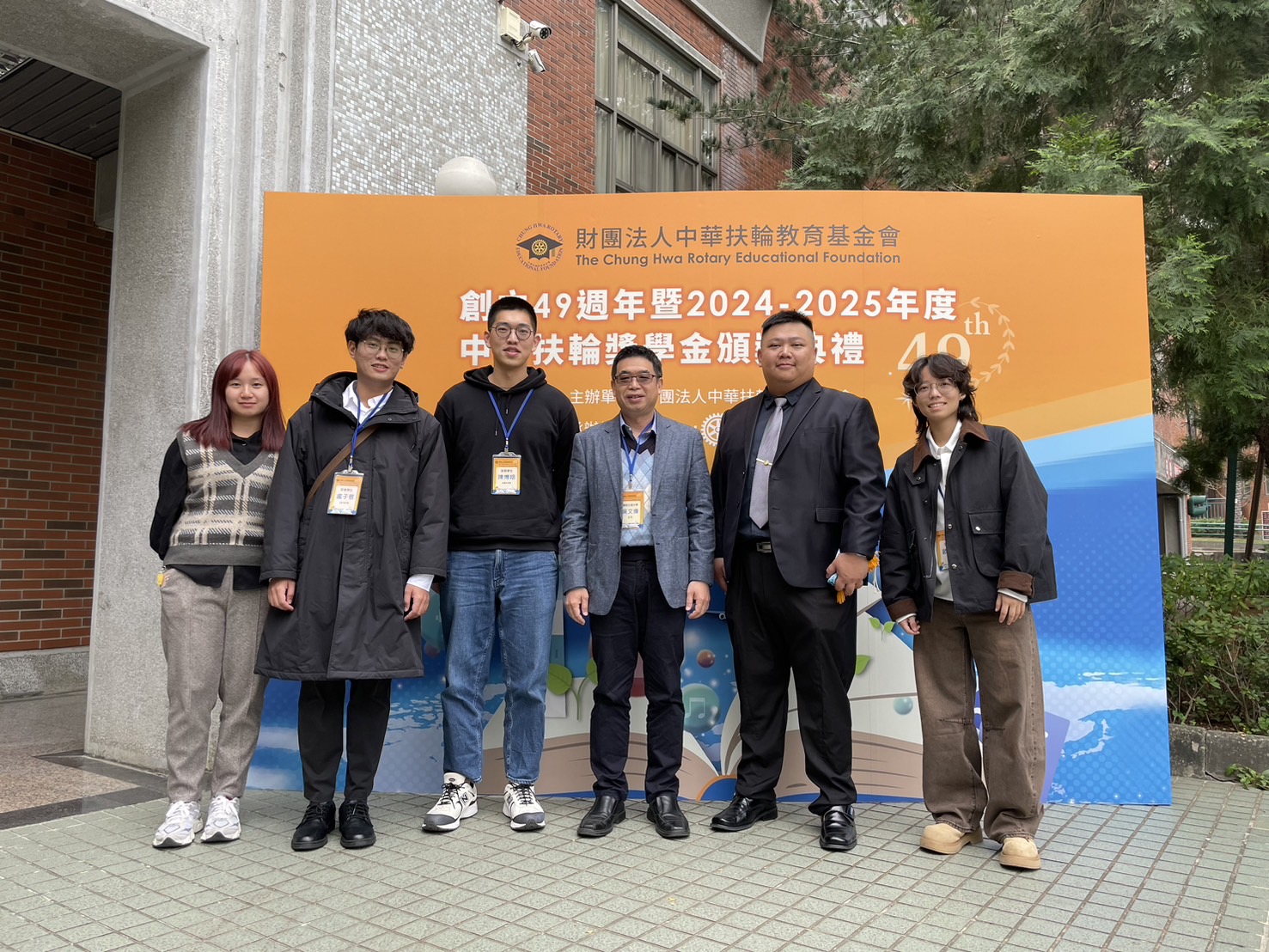
恭賀 中華扶輪教育基金會研究生獎學金 陽明交大材料系全國最多研究生得主! 本年度博士生18萬 碩士生13.5萬
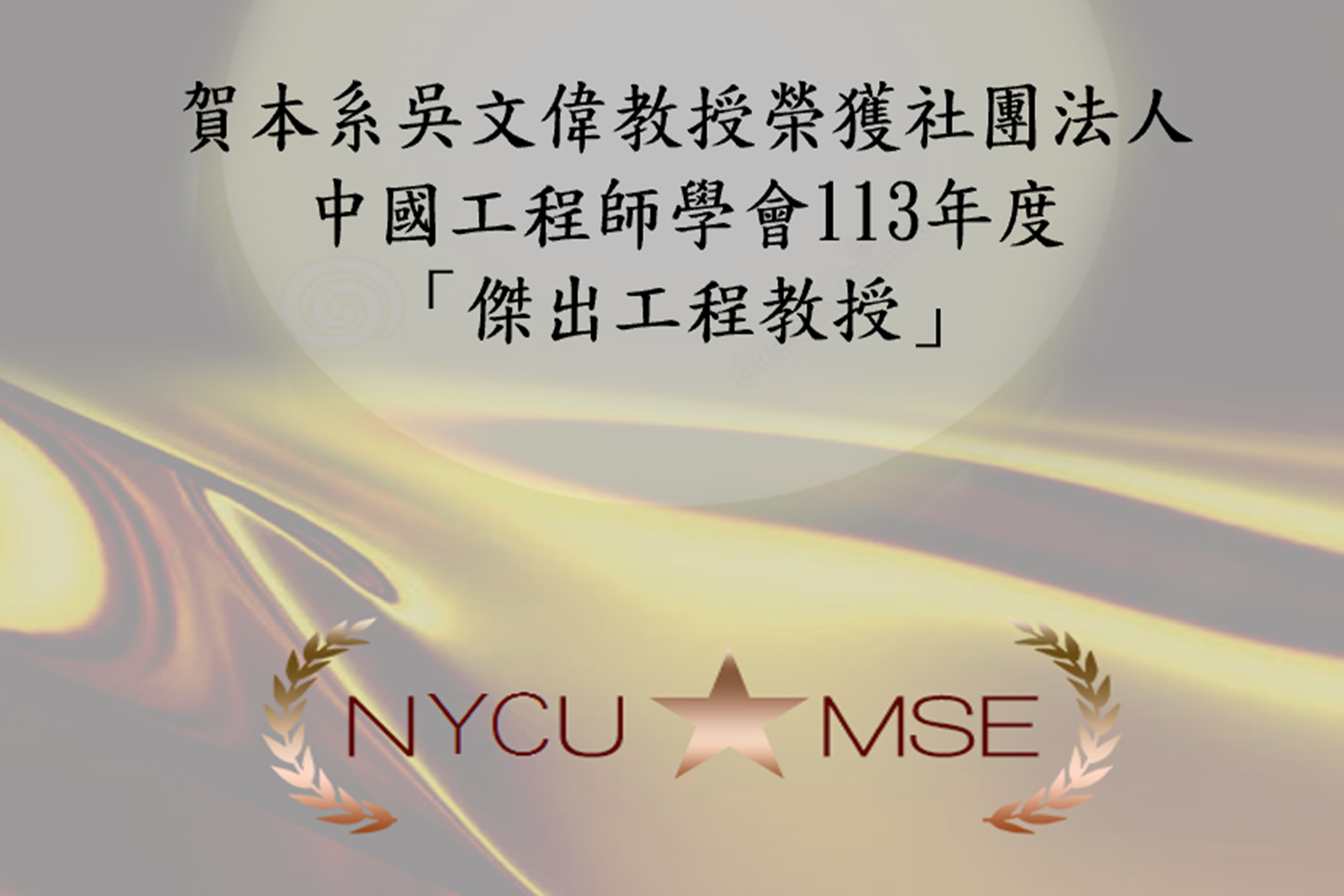
Congratulations to Professor Wen-Wei Wu from our department for receiving the "Outstanding Engineering Professor" award from the Chinese Institute of Engineers for the 113th year.
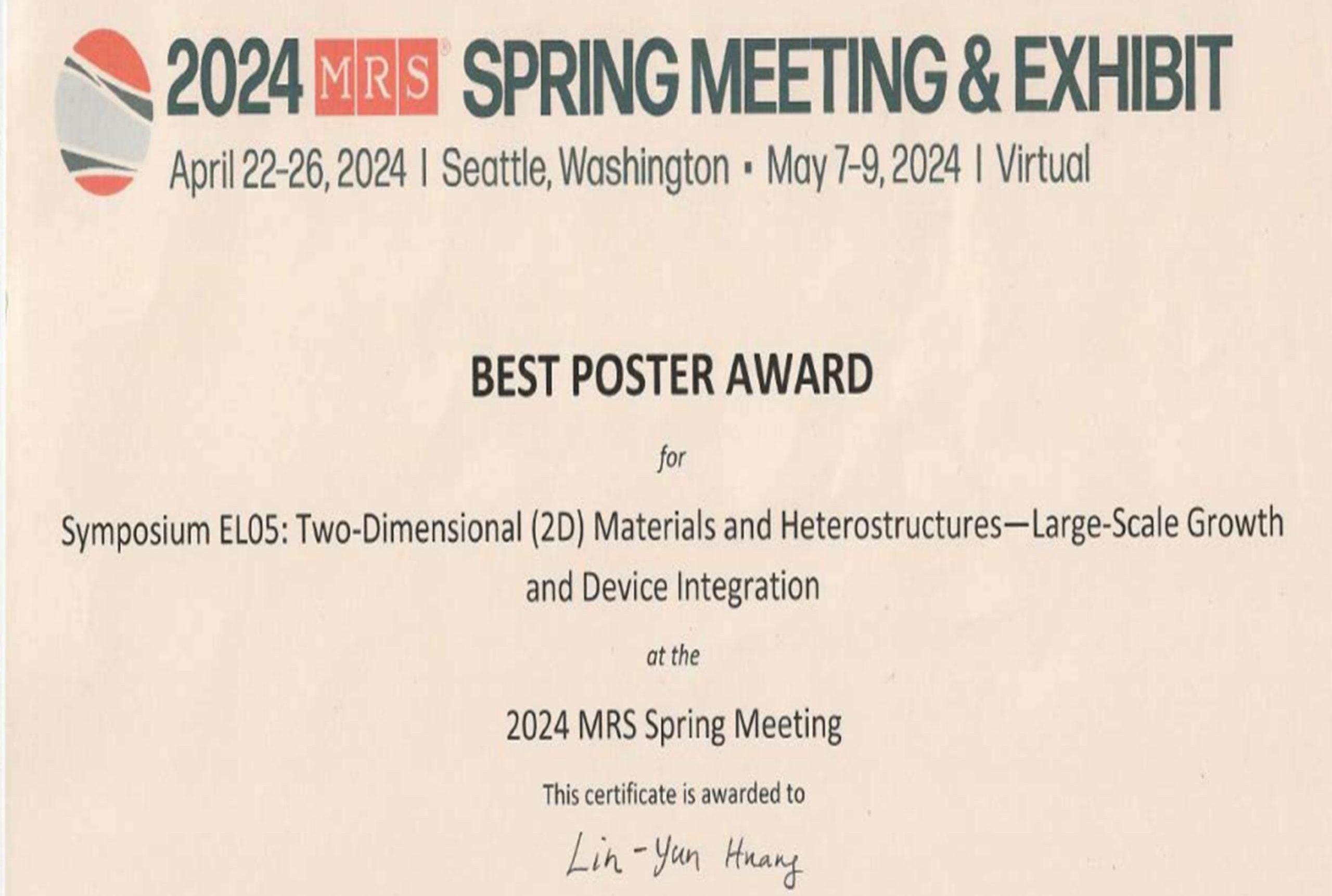
Congratulations to Lin-Yun Huang for winning the Best Poster Award at the prestigious MRS international materials conference.
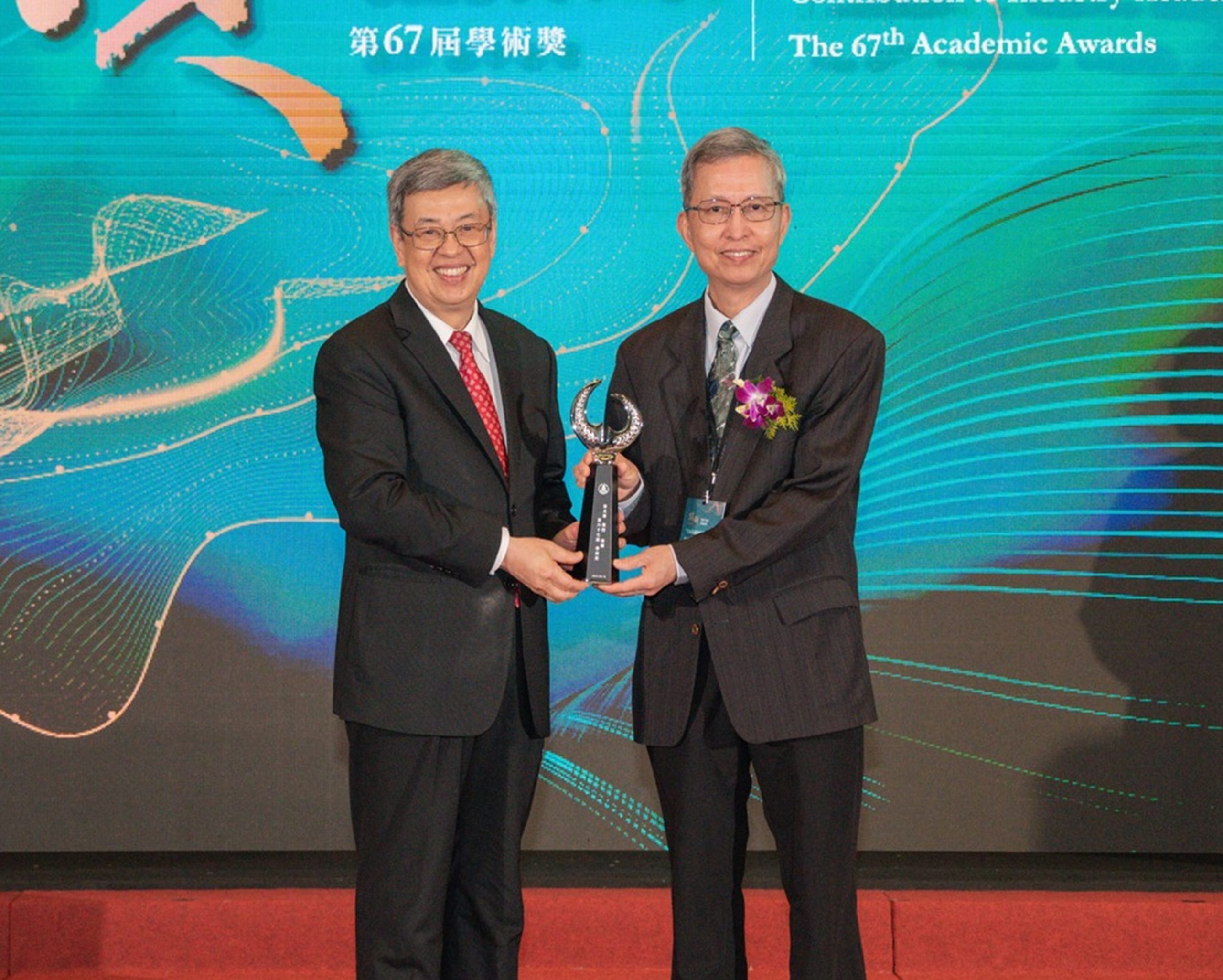
Congratulations to Professor Kung-Hwa Wei for receiving the 67th Ministry of Education Academic Award!
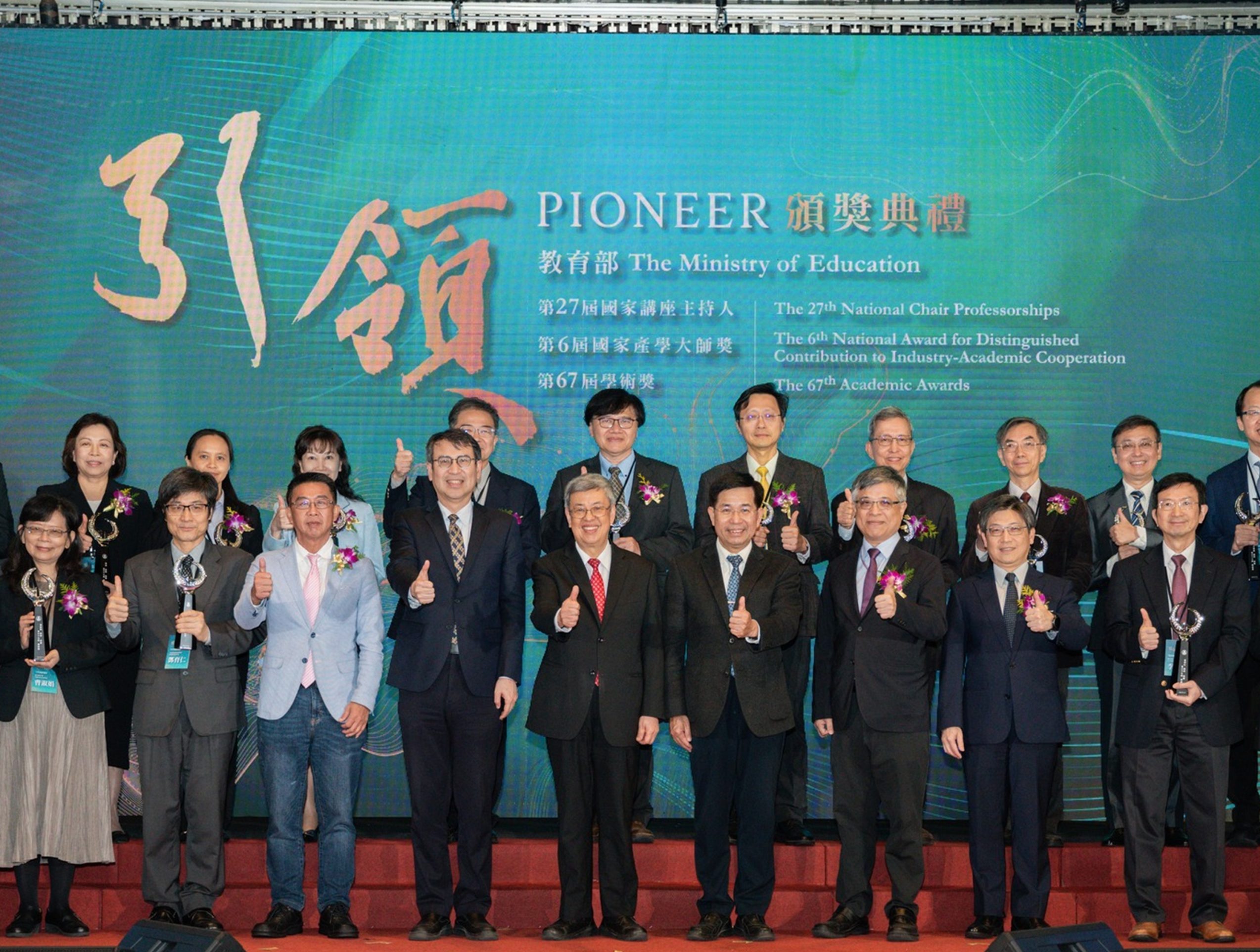
Congratulations to Professor Kung-Hwa Wei for receiving the 67th Ministry of Education Academic Award!
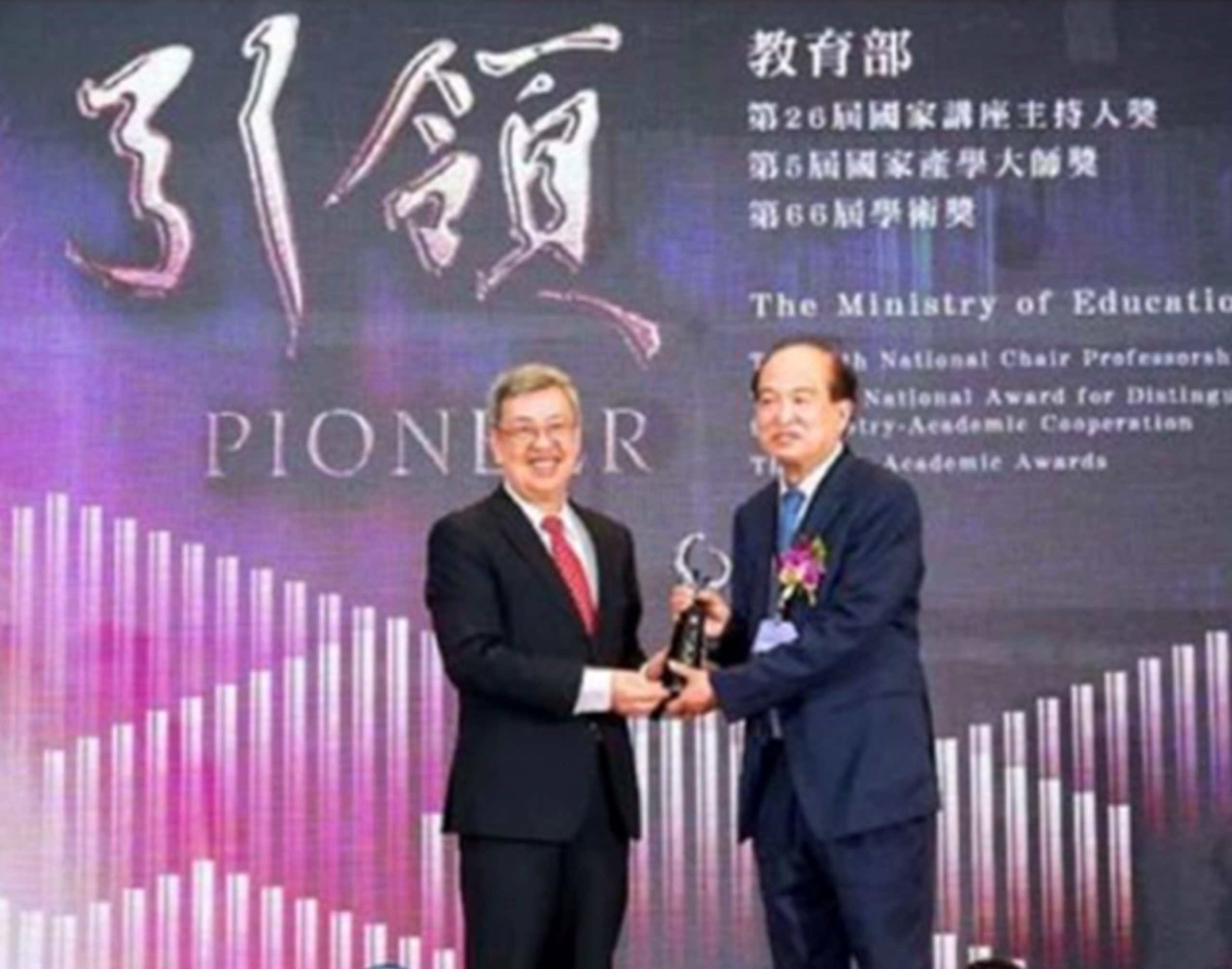
Congratulations to Professor Edward Yi Chang for receiving the 66th Ministry of Education Academic Award!

Congratulations to Professor Chih Chen for receiving the 30th Y. Z. Hsu Scientific Award!
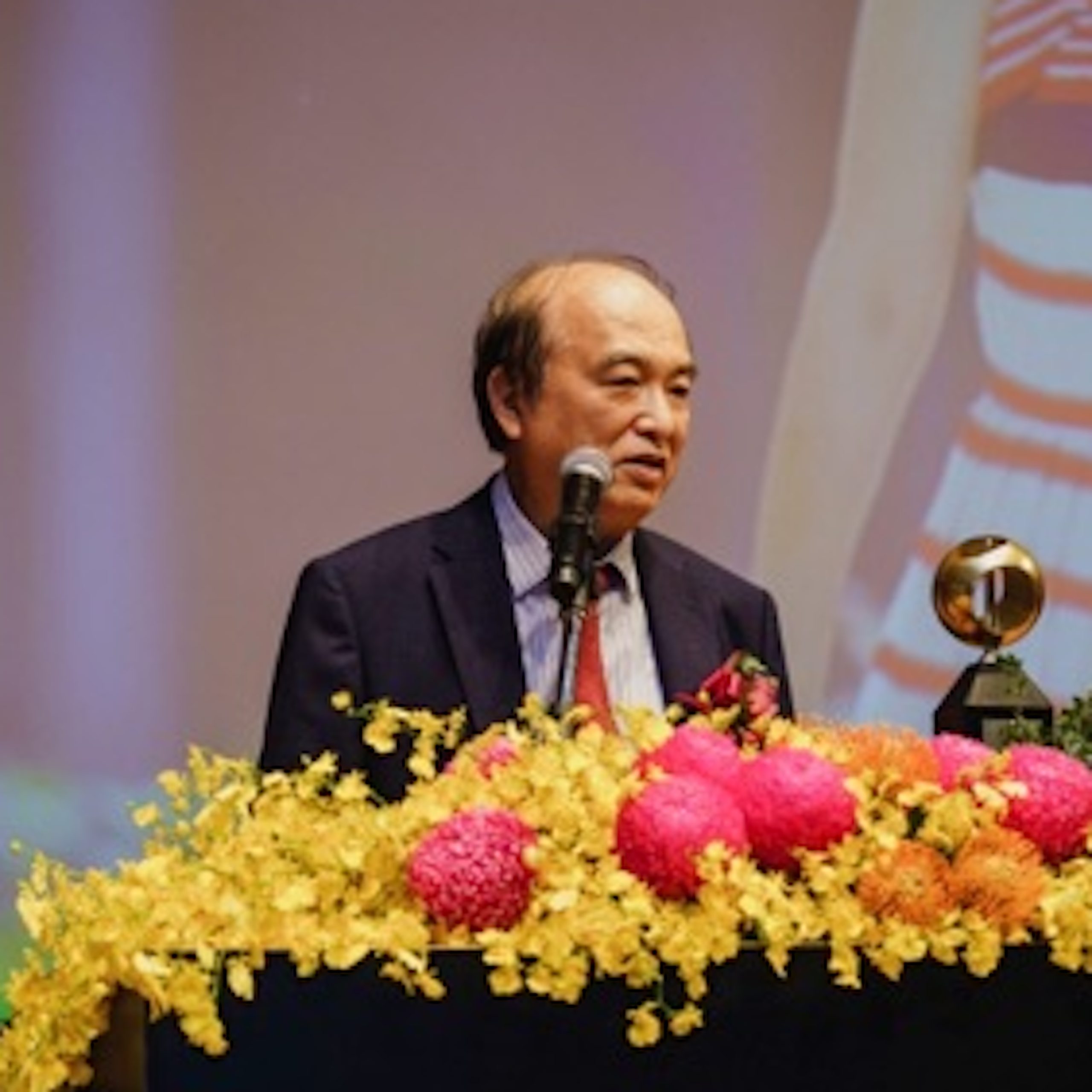
Congratulations to Vice President Edward Yi Chang from our department for receiving the honor of the 27th Y. Z. Hsu Scientific Award!

Congratulations to Vice President Edward Yi Chang for leading the MOST Value Creation Project and receiving the Academic Entrepreneurship Pioneer Award!
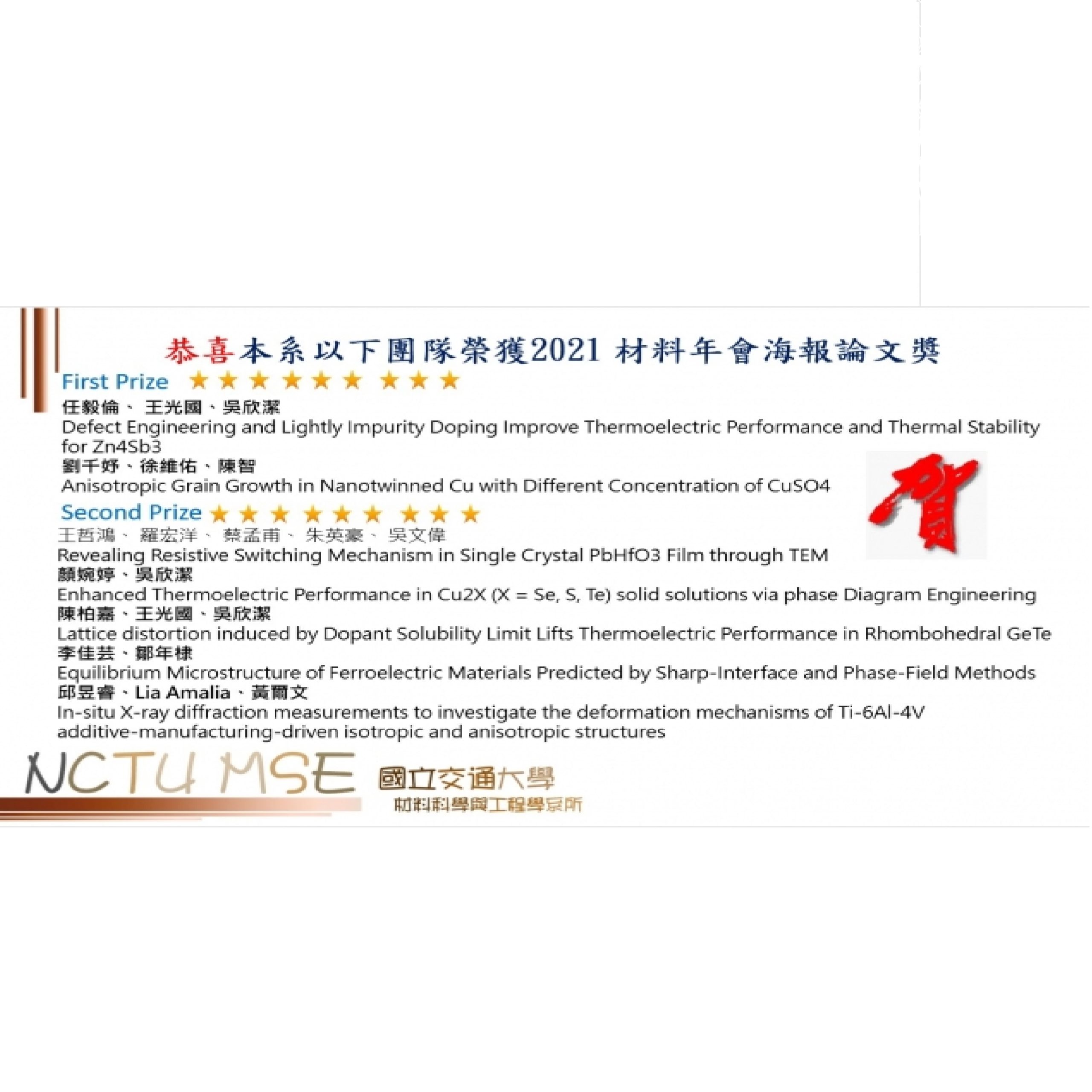
Congratulations to the following teams for winning the 2021 Materials Annual Conference Poster Award!
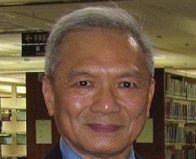
Congratulations to our Distinguished Chair Professor Academician Jing-Ning Du for receiving the Ministry of Education Yushan Scholar honor!
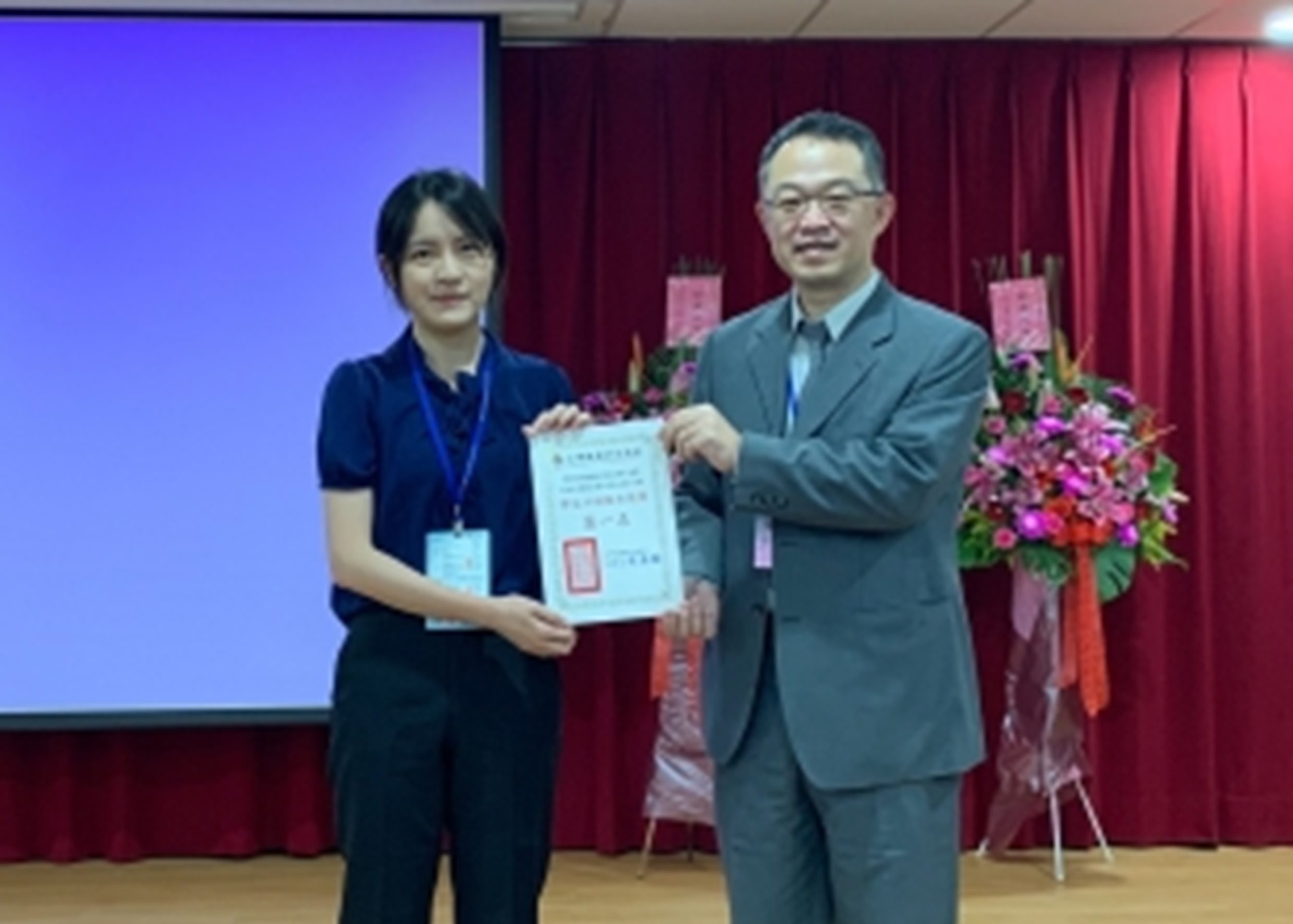
Congratulations to our Ph.D. students for receiving awards at the 2020 Taiwan Association for Coating Technology Annual Meeting!
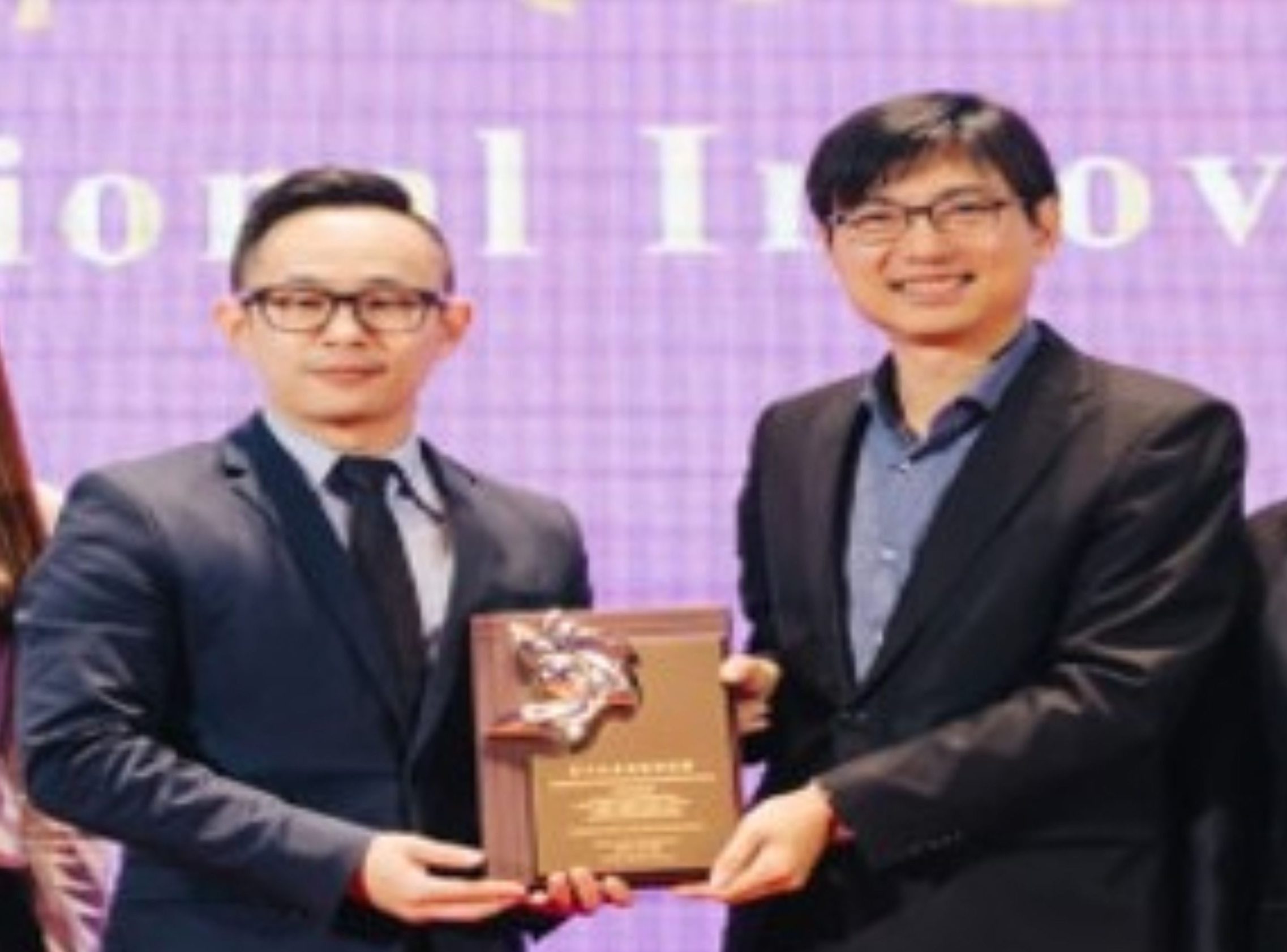
Congratulations to NCTU Materials for winning the 15th National Innovation Award – Academic Spin-off Award!

Congratulations to Ph.D. student Pin-Hsuan Ho from the Institute of Materials Science for winning The Best Student Award, 1st Place at ICPT 2023!
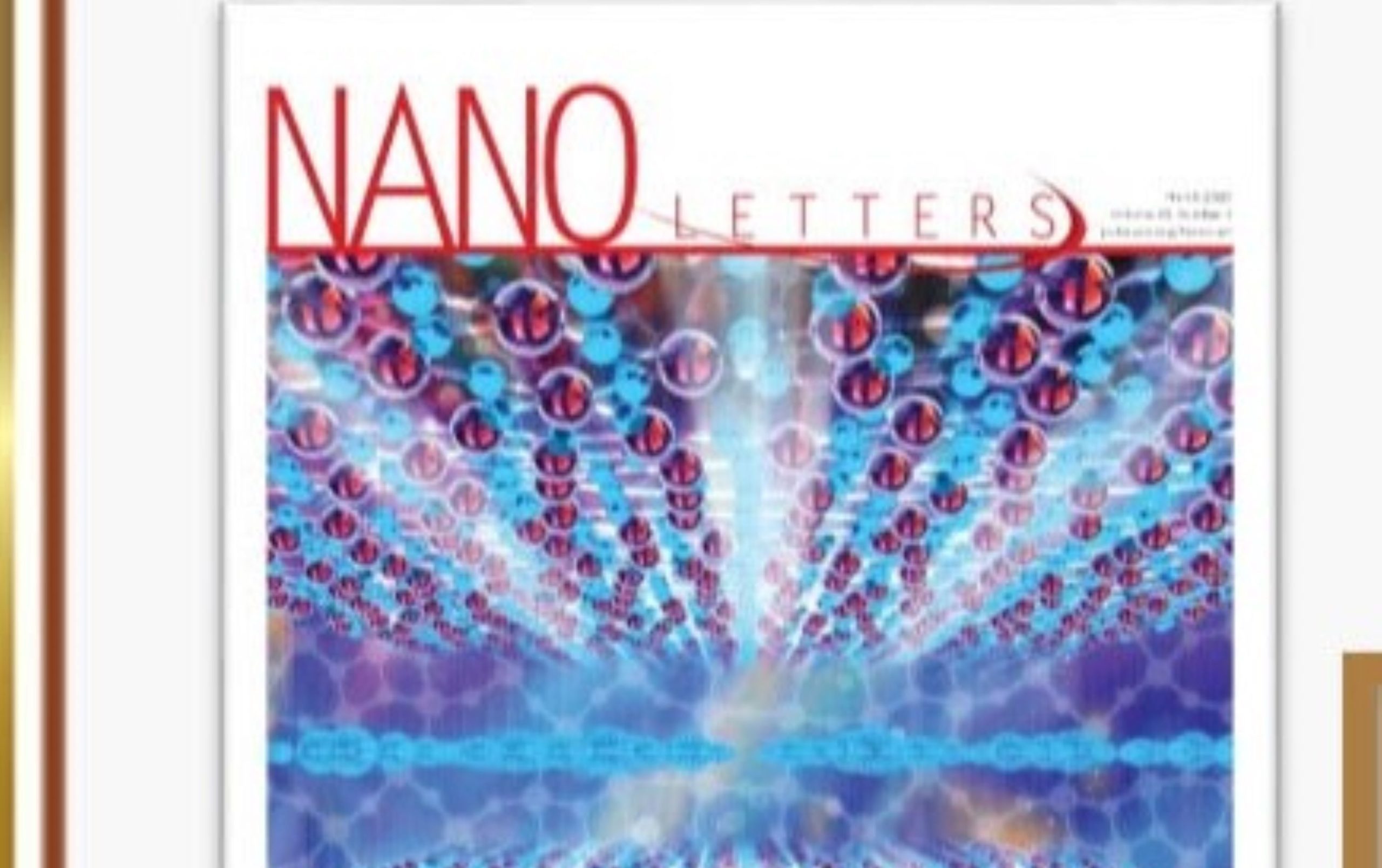
Congratulations to Professor Wen-Wei Wu for having his research featured on the cover of Nano Letters!
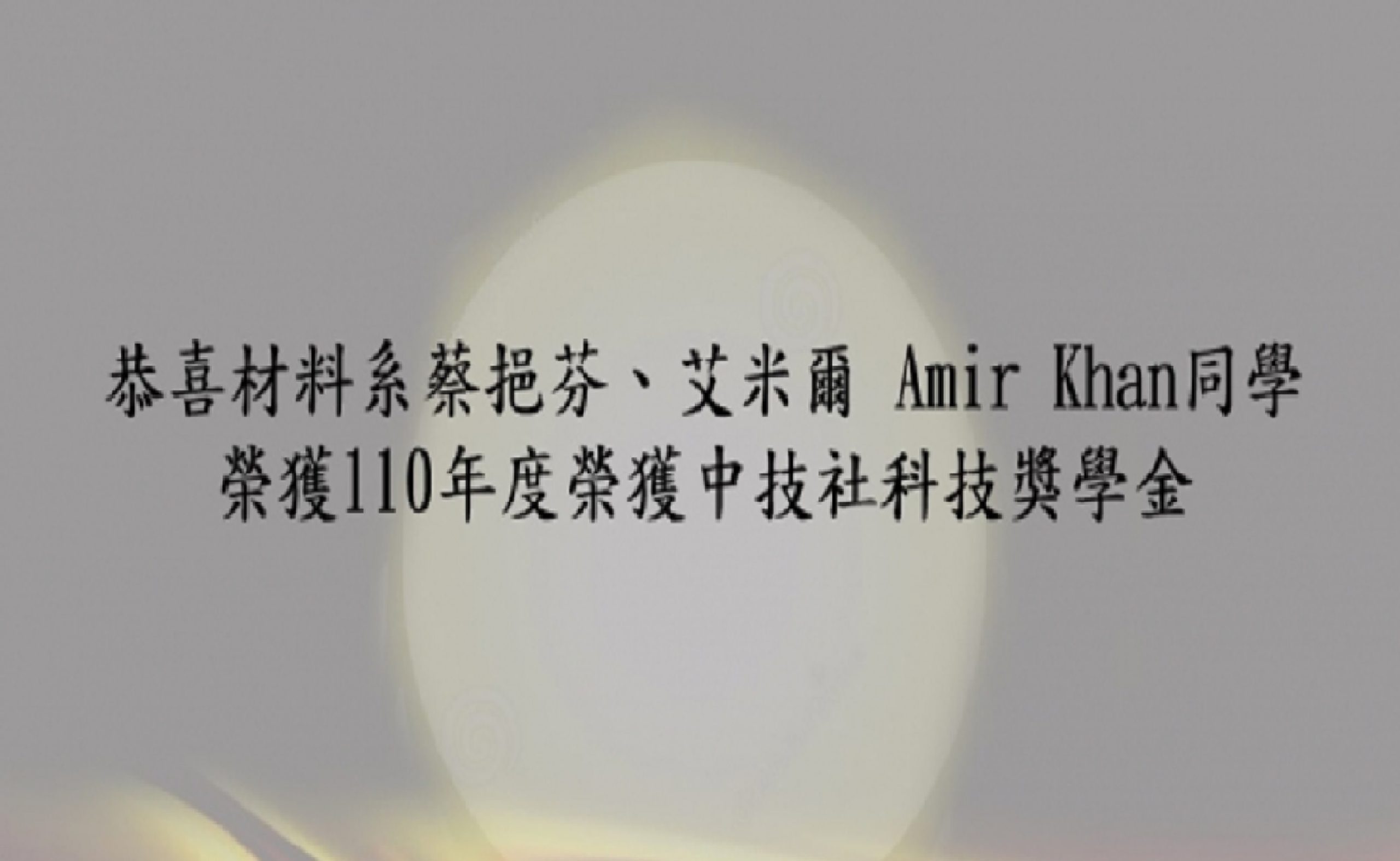
Congratulations to Yi-Fen Tsai and Amir Kjan from the Department of Materials Science for receiving the 2021 CTCI Foundation Science and Technology Scholarship!
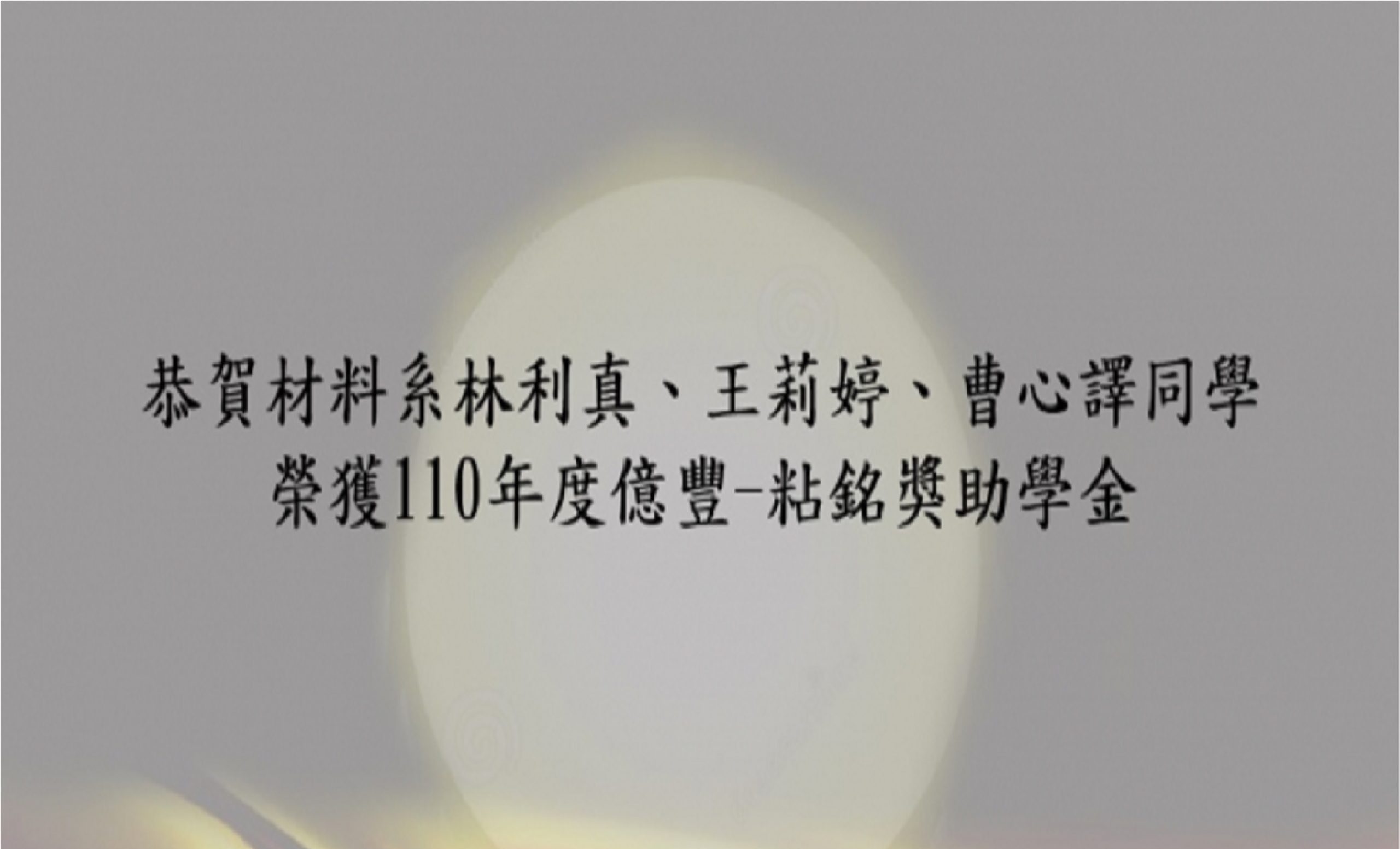
Congratulations to Li-Chen Lin, Li-Ting Wang, and Hsin-Yi Tsao from the Department of Materials Science for receiving the 2021 Nien-Ming Scholarship!
獲UIUC碩士學位-scaled.jpg)
Congratulations to Huang Yi-Hsiu (left), a dual-degree program student from the Department of Materials Science, for earning a master's degree from UIUC and being featured in Cheers magazine!
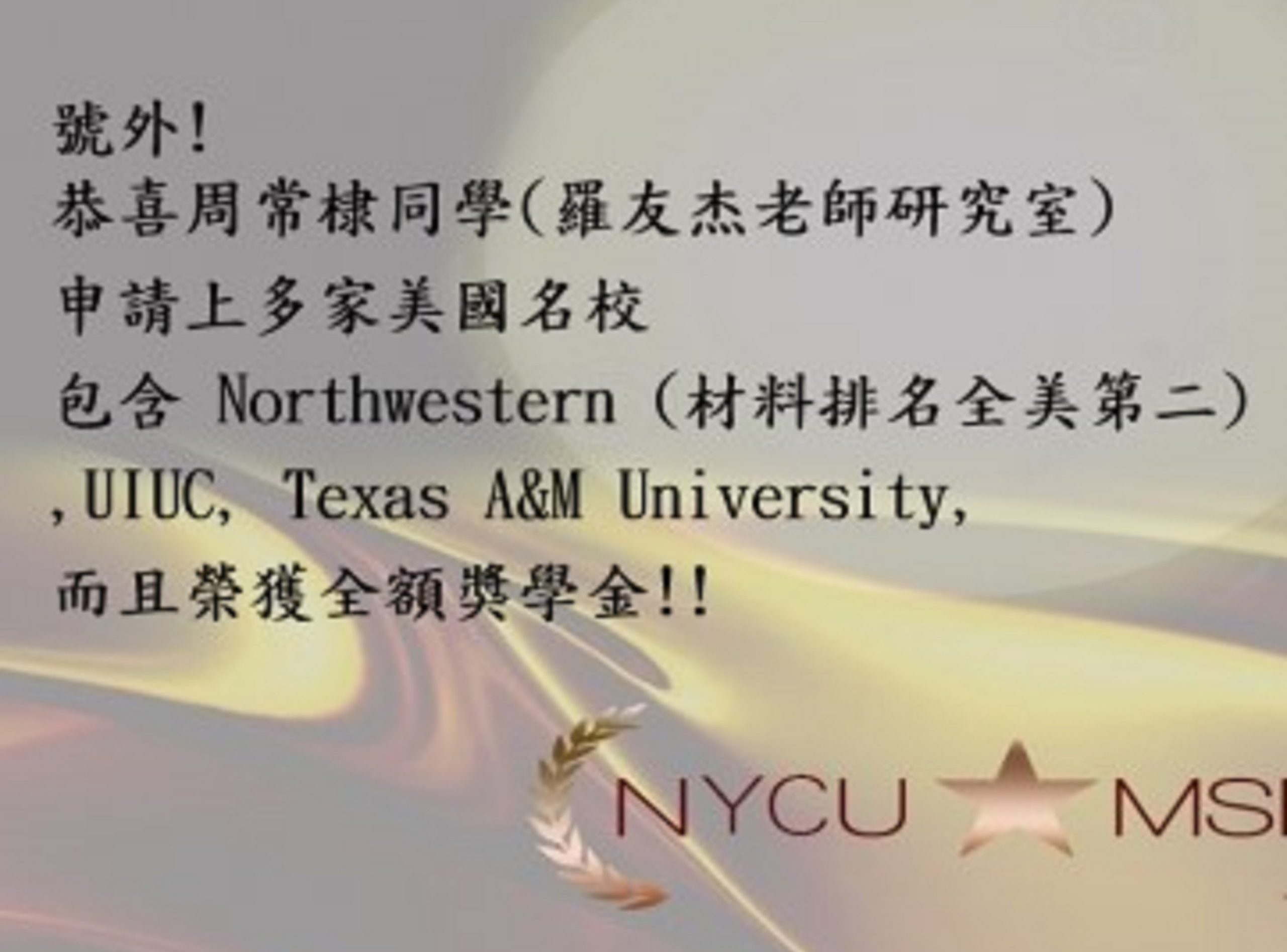
Congratulations to Chang-Ti Chou for being admitted to several prestigious U.S. universities, including Northwestern University (ranked 2nd in materials science nationwide), and for receiving a full scholarship!
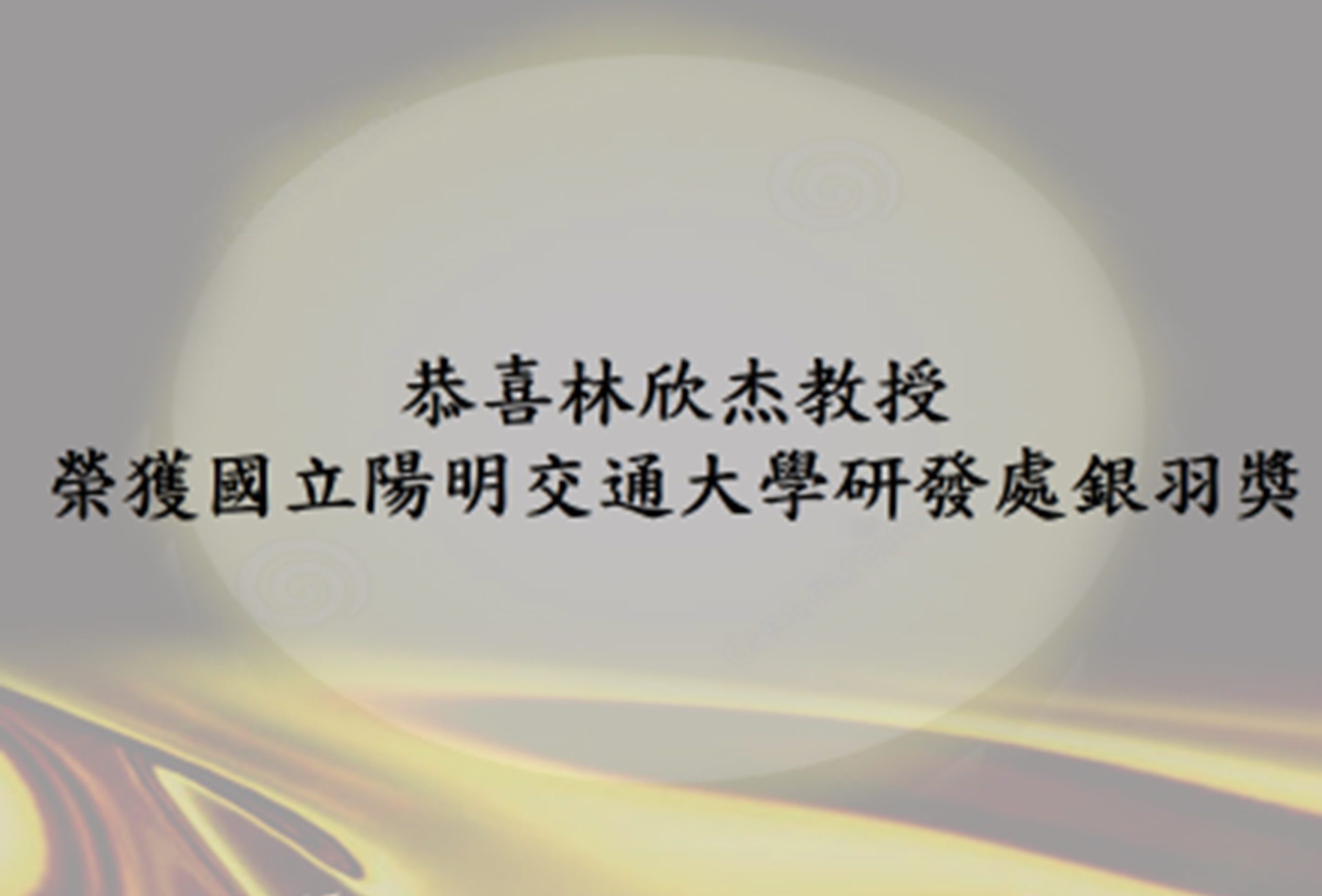
Congratulations to Professor Hsin-Chieh Lin for receiving the Silver Feather Award from the Office of Research and Development at National Yang Ming Chiao Tung University!

Congratulations to Lifetime Chair Professor Kung-Hwa Wei for receiving the 2021 Lifetime Achievement Award from the Polymer Society!
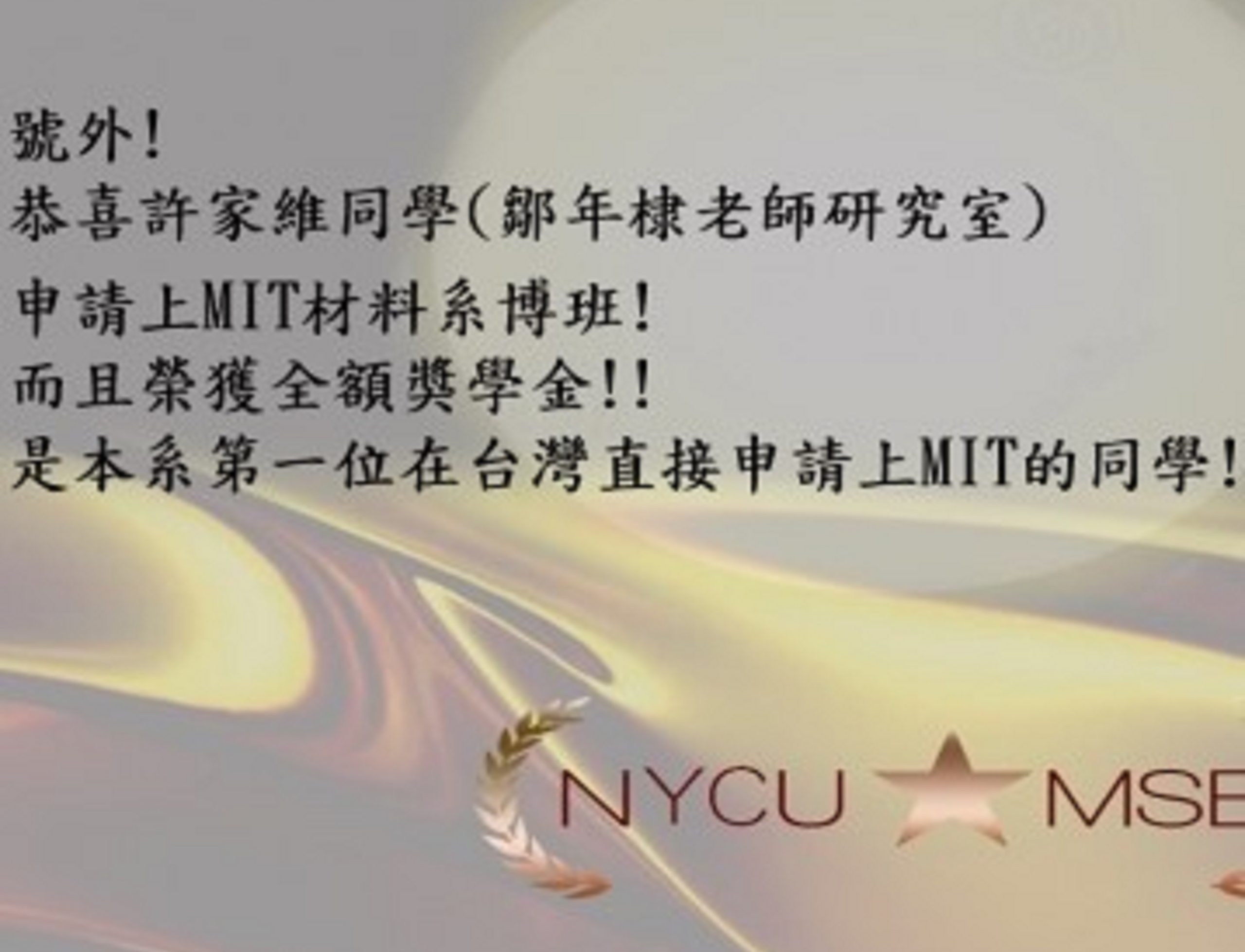
Congratulations to Chia-Wei Hsu for being admitted to the Ph.D. program in the Department of Materials Science at MIT and receiving a full scholarship!
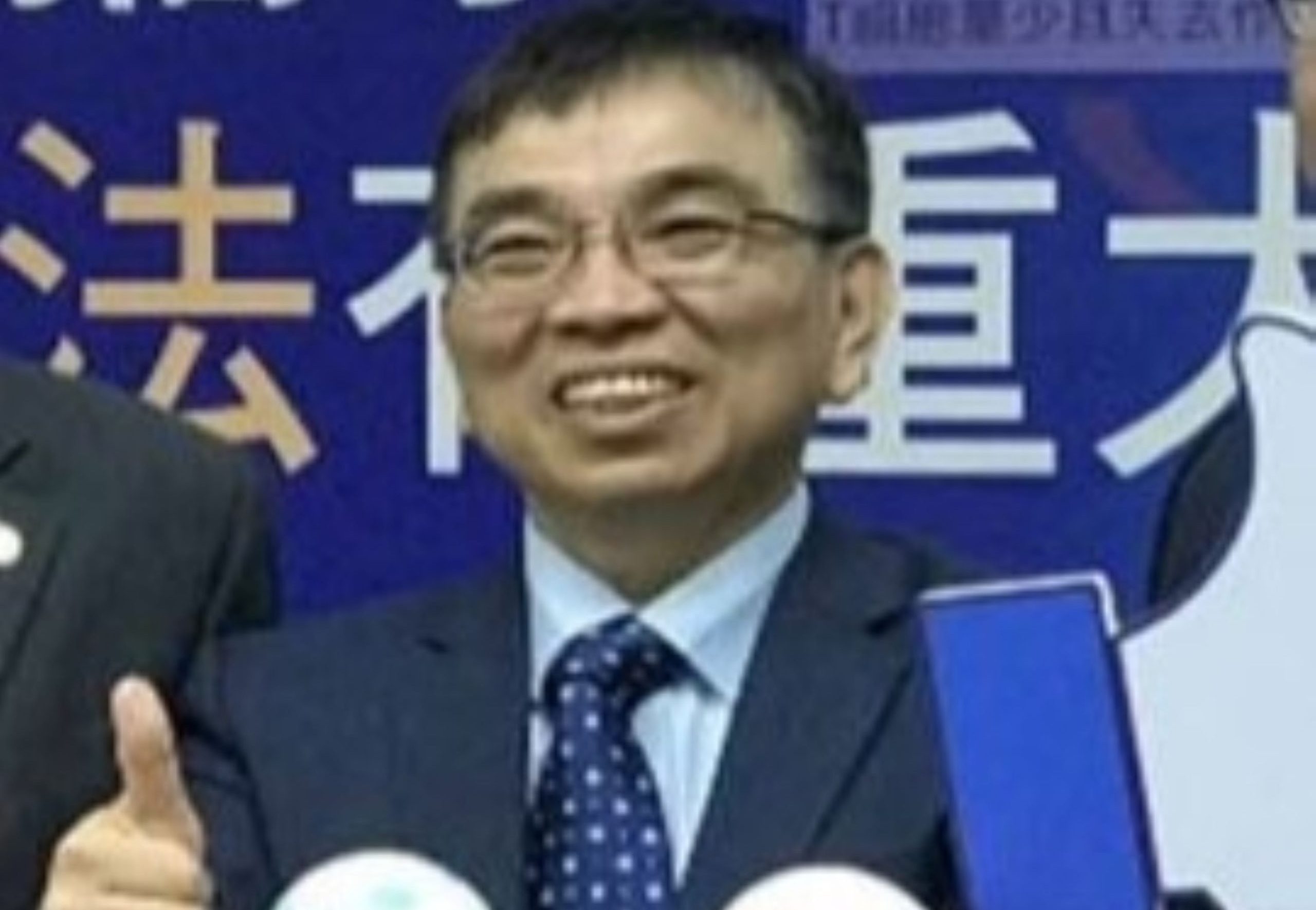
Congratulations to Professor Sam-Yuan Chen for achieving a groundbreaking innovation in tumor immunotherapy, published in the prestigious journal *Nature Nanotechnology* and featured by major media outlets!

Congratulations to Professor Sam-Yuan Chen for receiving the 17th National Innovation Award (Academic Spin-off – Biotech and Precision Medicine)!
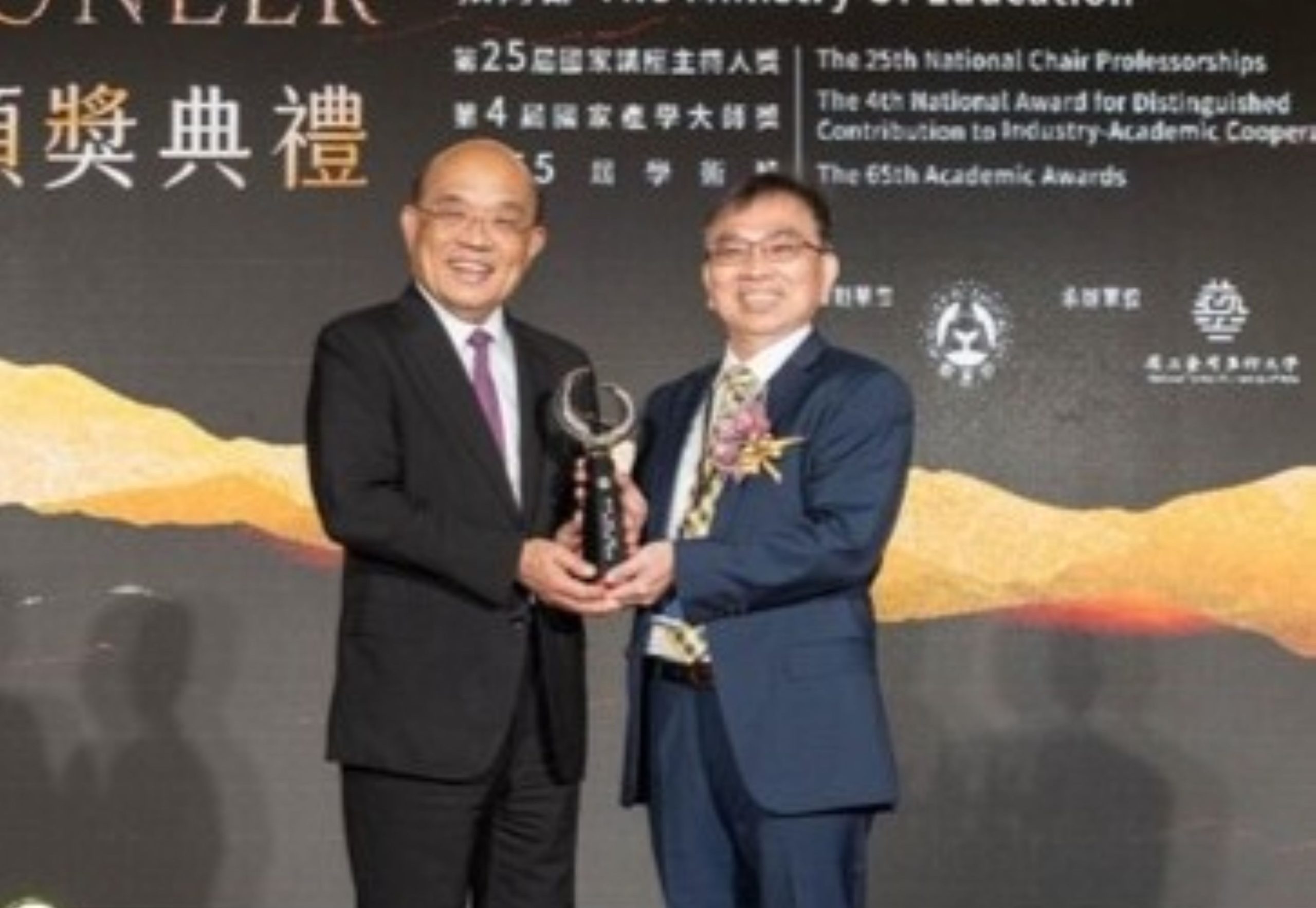
Congratulations to Distinguished Chair Professor Sam-Yuan Chen for receiving the 65th Ministry of Education Academic Award!
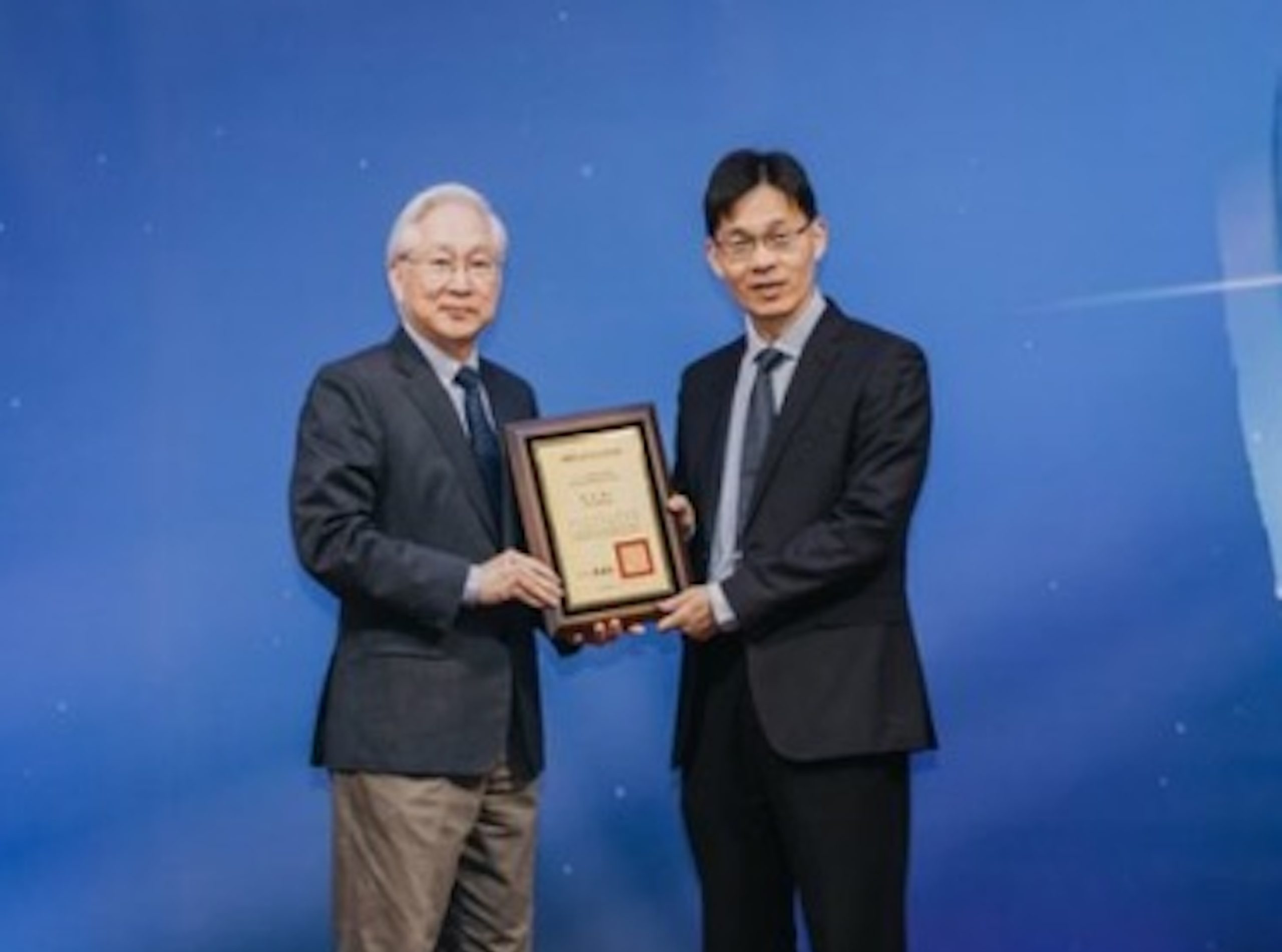
Congratulations to Professor Chih Chen for receiving the Outstanding Research Award from the National Science and Technology Council for the second time!

Congratulations to Professor Yuan-Chieh Tseng for being awarded Senior Fellowship by the Higher Education Academy (HEA) in the United Kingdom!

Congratulations to Distinguished Professor Yuan-Chieh Tseng for leading his team in collaboration with ITRI, which was featured on ETtoday News!

Congratulations to Yi-Ming Tseng from our institute for being admitted to the Ph.D. program in Electrical and Computer Engineering (ECE) at the National University of Singapore (NUS) with a four-year full scholarship!

Congratulations to Professor Chao-Yao Yang for receiving the 2022 Research Grant from the Pan Wen Yuan Foundation!
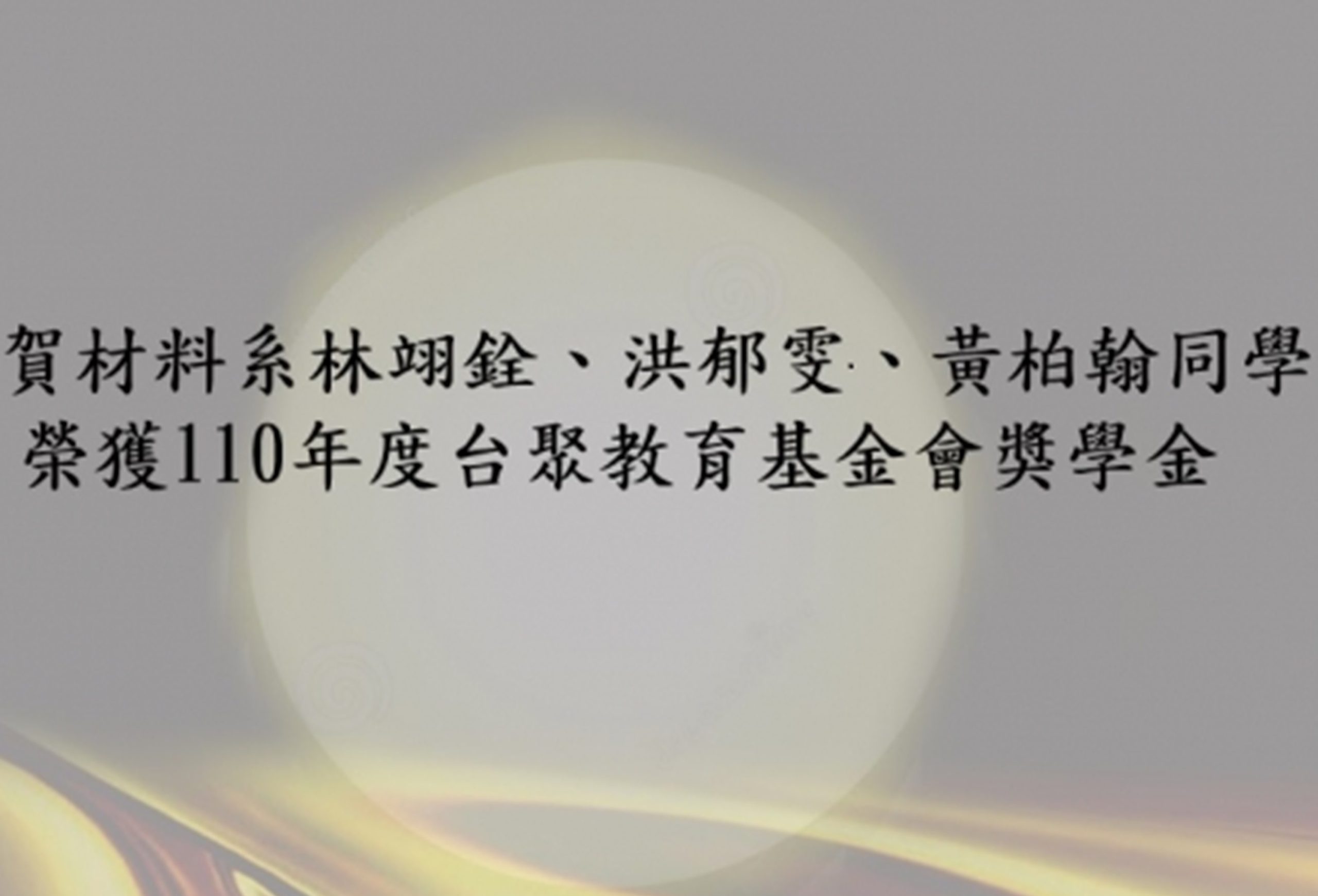
Congratulations to Yi-Chuan Lin, Yu-Wen Hung, and Po-Han Huang from the Department of Materials Science for receiving the 2021 Formosa Plastics Education Foundation Scholarship!
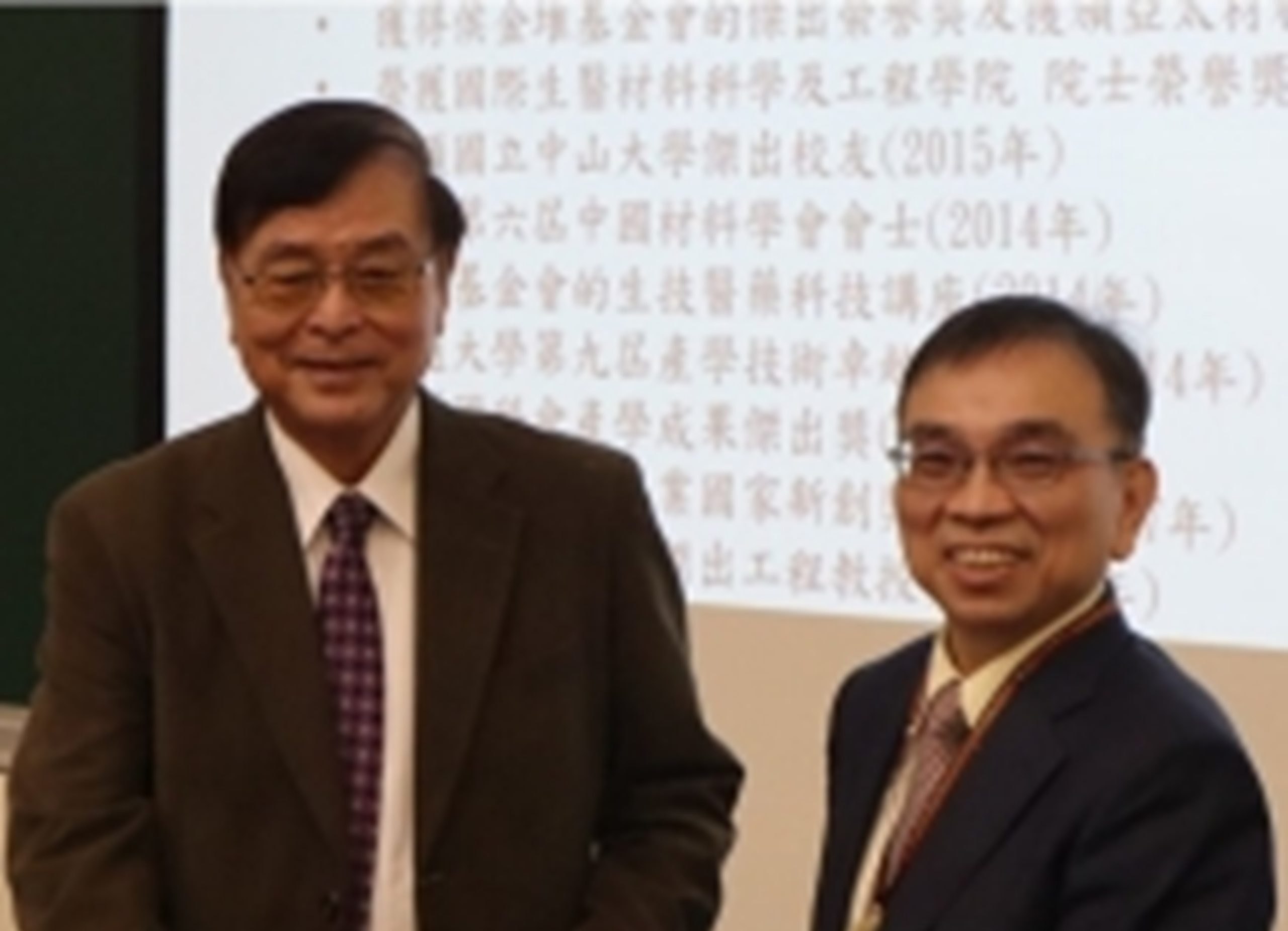
Congratulations to Distinguished Chair Professor Sam-Yuan Chen for receiving the 2021 Materials Science Award from the CTCI Foundation!
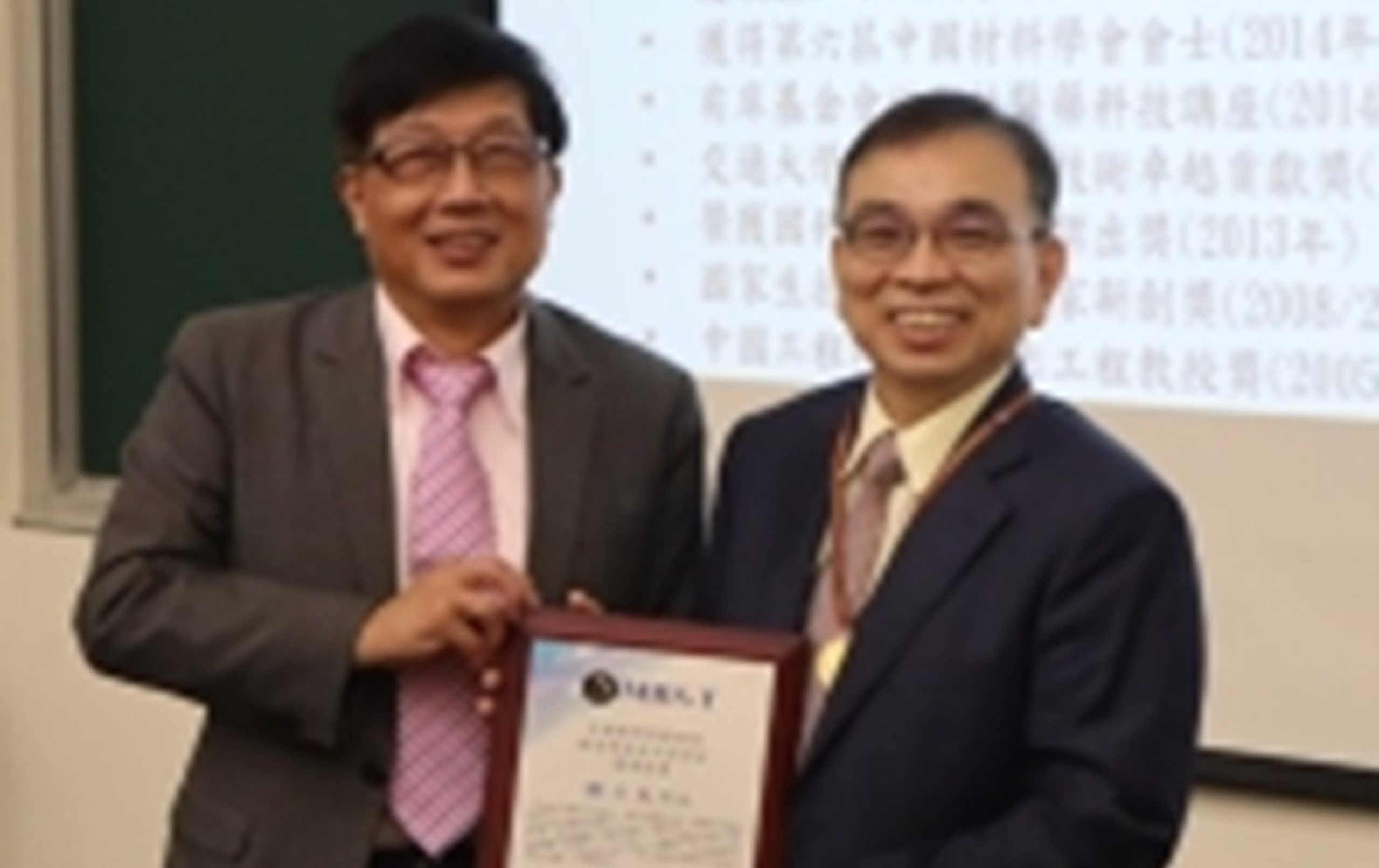
Congratulations to Distinguished Chair Professor Sam-Yuan Chen for receiving the highest honor from the Materials Society, the Mr. Lu Chi-Hung Memorial Award!
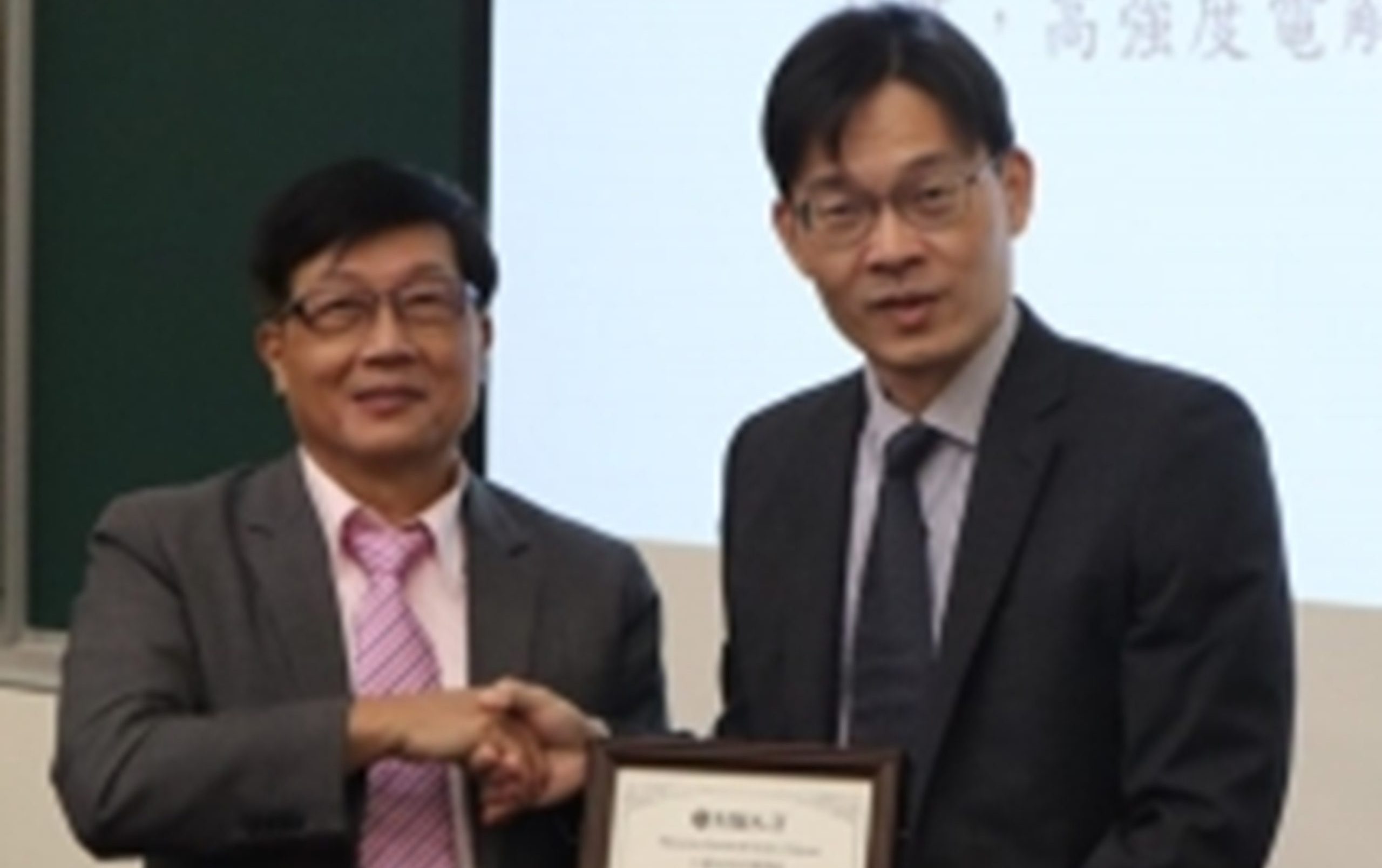
Congratulations to Director Chih Chen for being named a 2021 Fellow of the Materials Society!

Congratulations to Professor Yuan-Chieh Tseng's laboratory for achieving significant results in the development of innovative bidirectional digital-analog magnetic memory!
Admissions Information
ADMISSION
more

High School Student Section
more
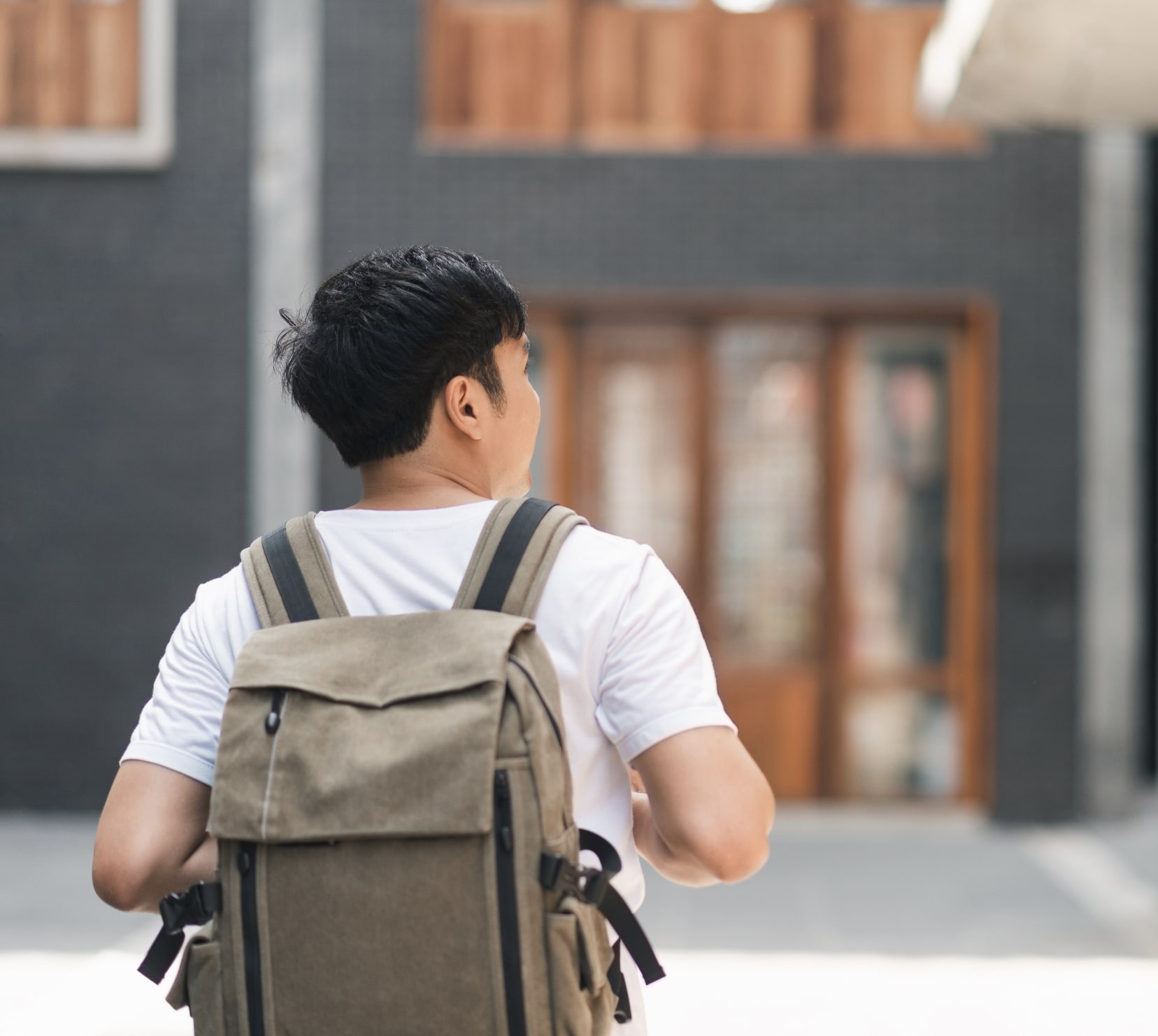
FAQ

How do I get to Engineering Building 6?
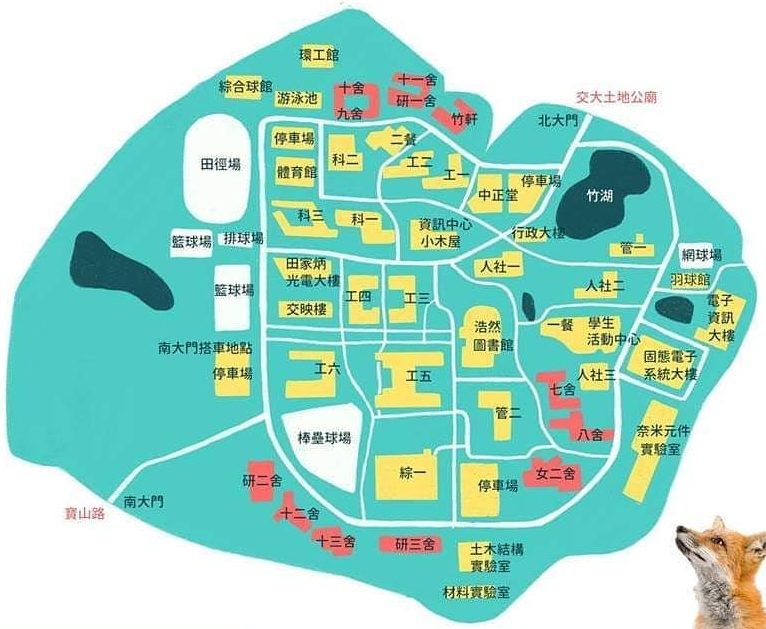
Where is the class location?

How can I find the professor's office?
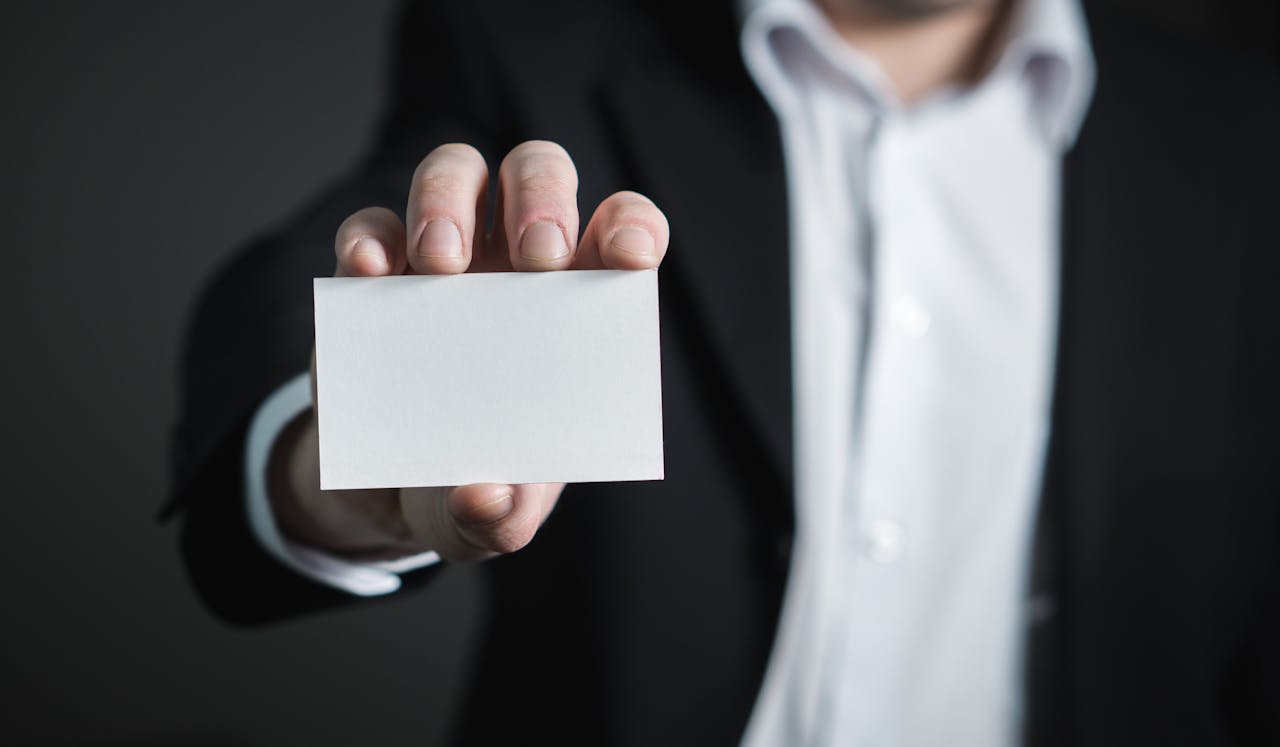
How to apply for an access card for Engineering Building 6?
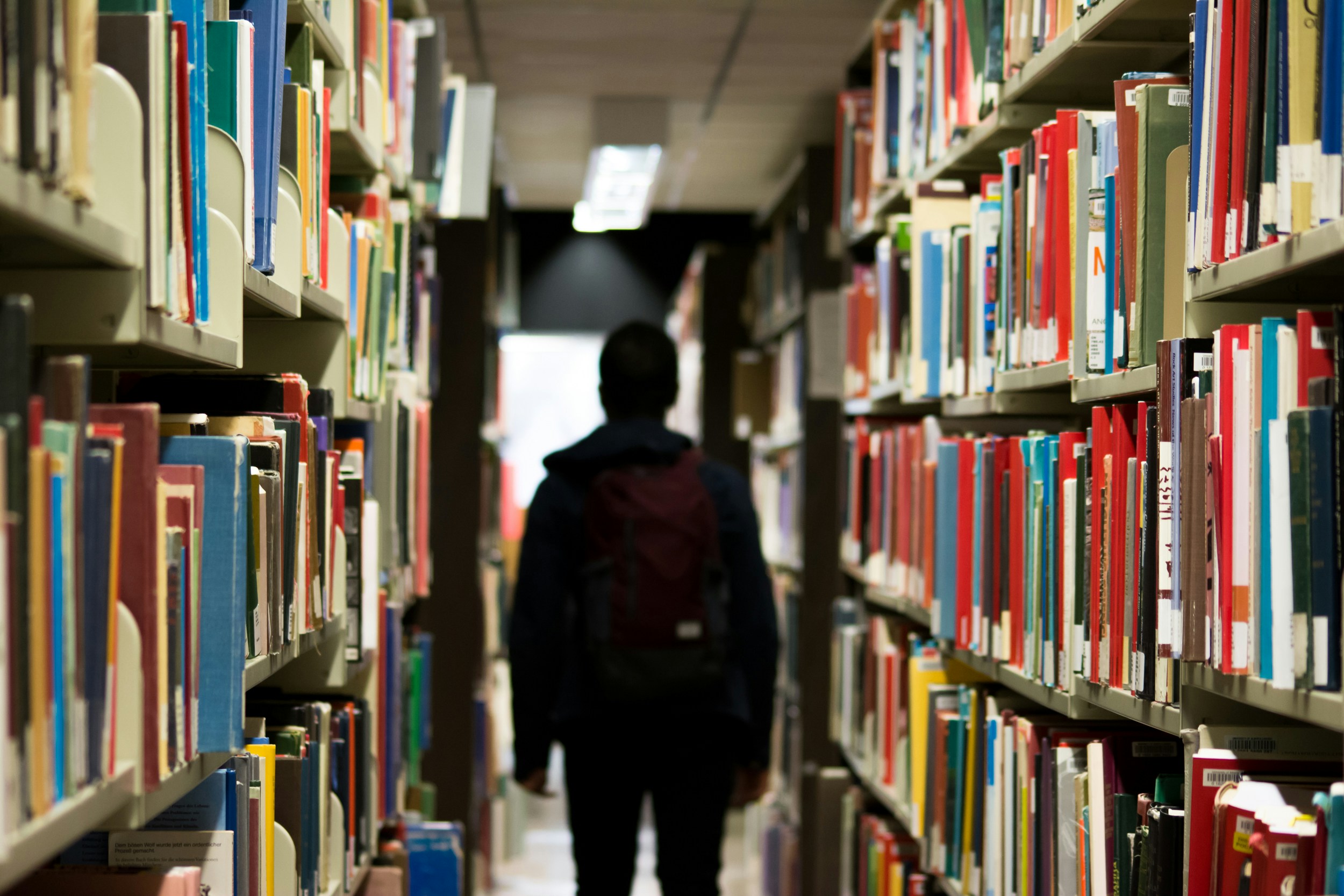
Where is a good place to study?
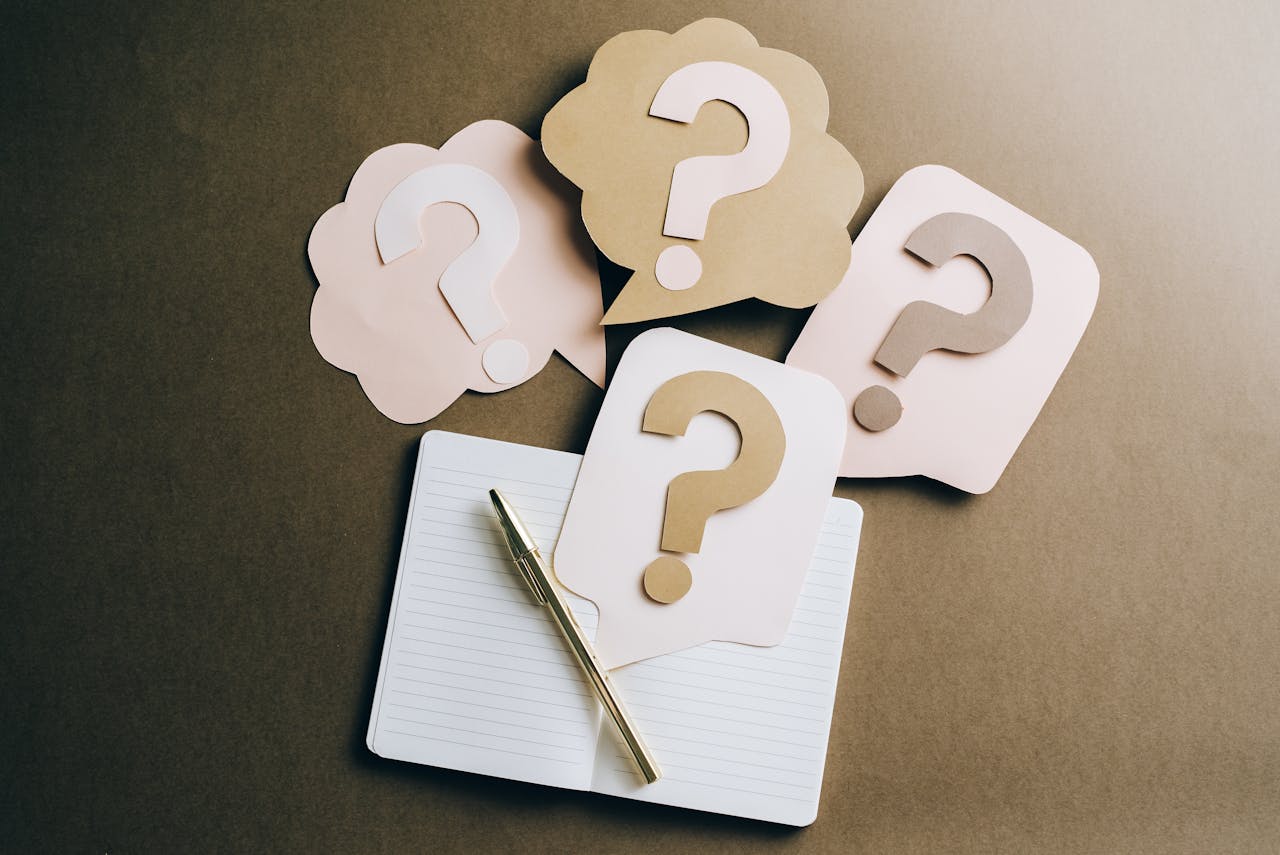
What is GPA?
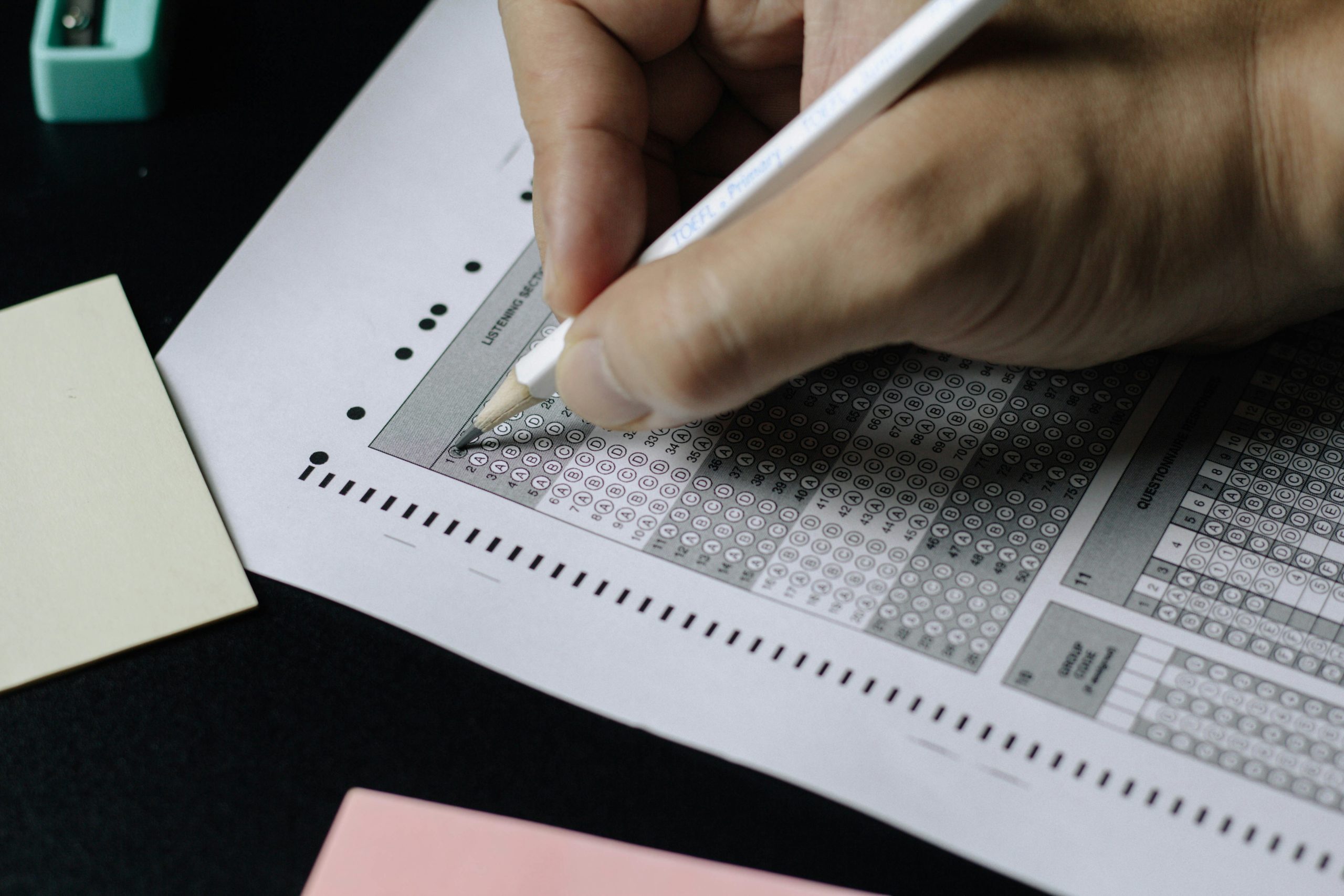
How to apply for transcripts and enrollment certificates?

What are the ways to relieve stress?

What is a buddy system?
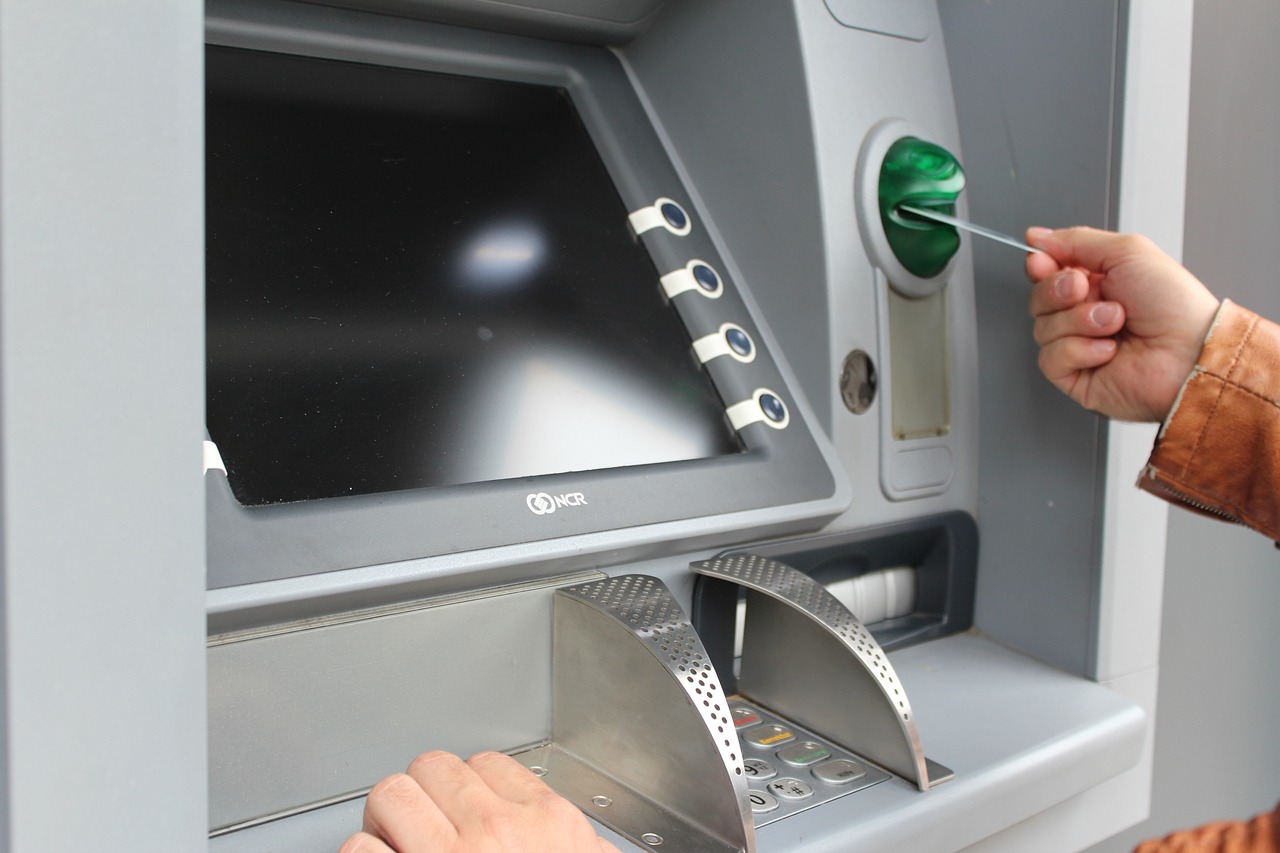
Where is the ATM located on the Guangfu campus?
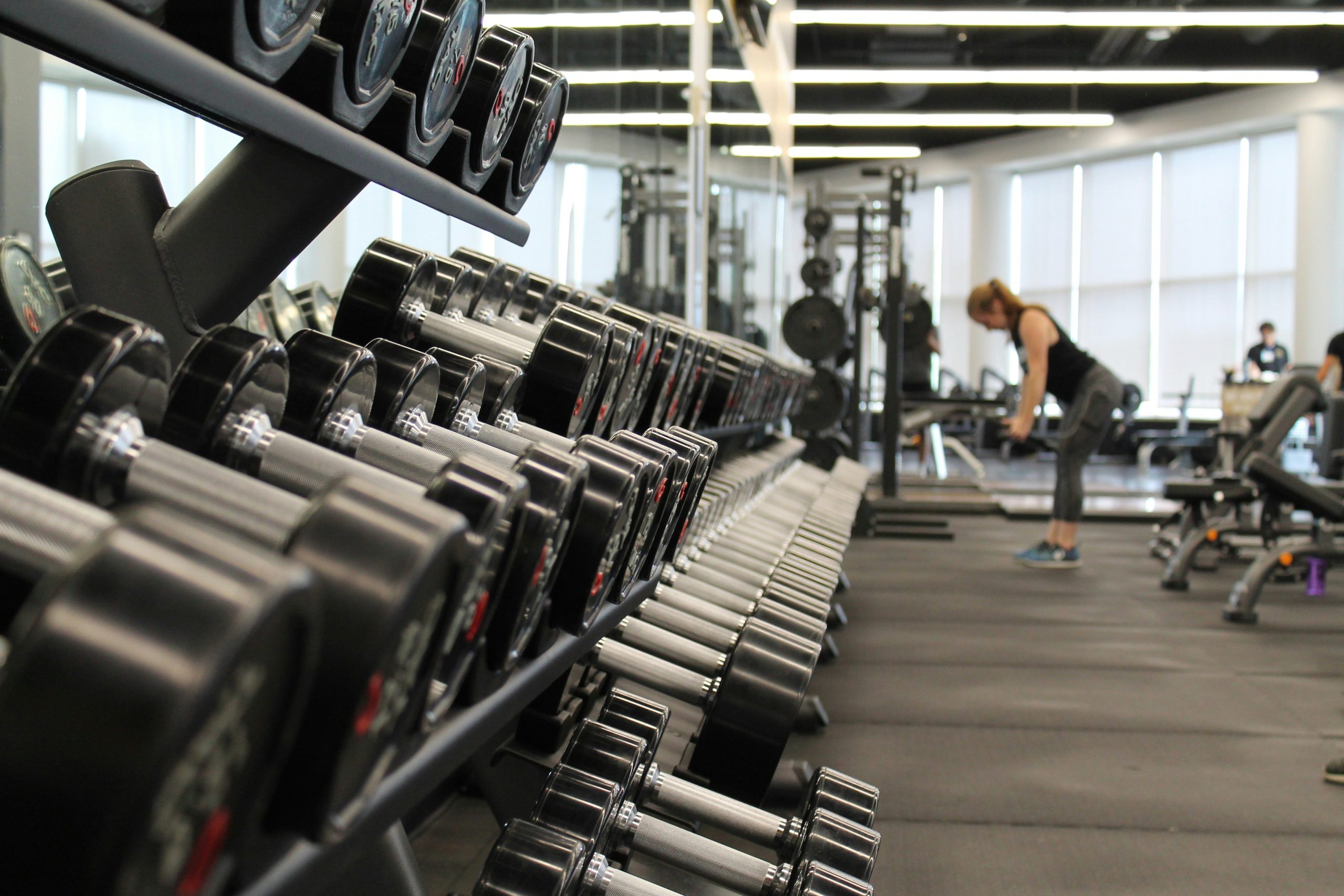
What sports facilities are available on the Guangfu campus?

How to pick up home delivery parcels and registered mail?

How to book a classroom in Engineering Building 6?
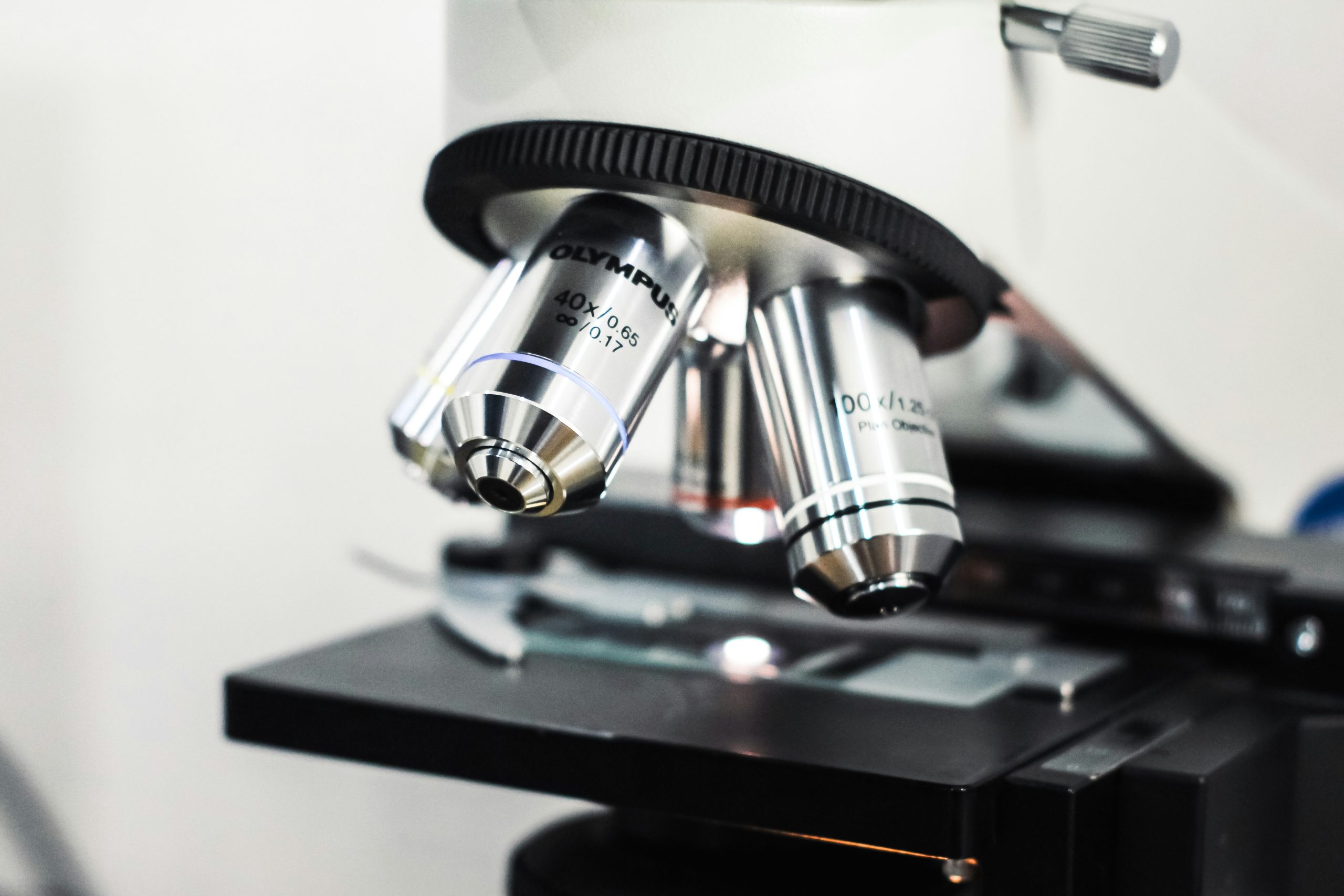
How to borrow equipment from the undergraduate laboratory on the fourth floor?
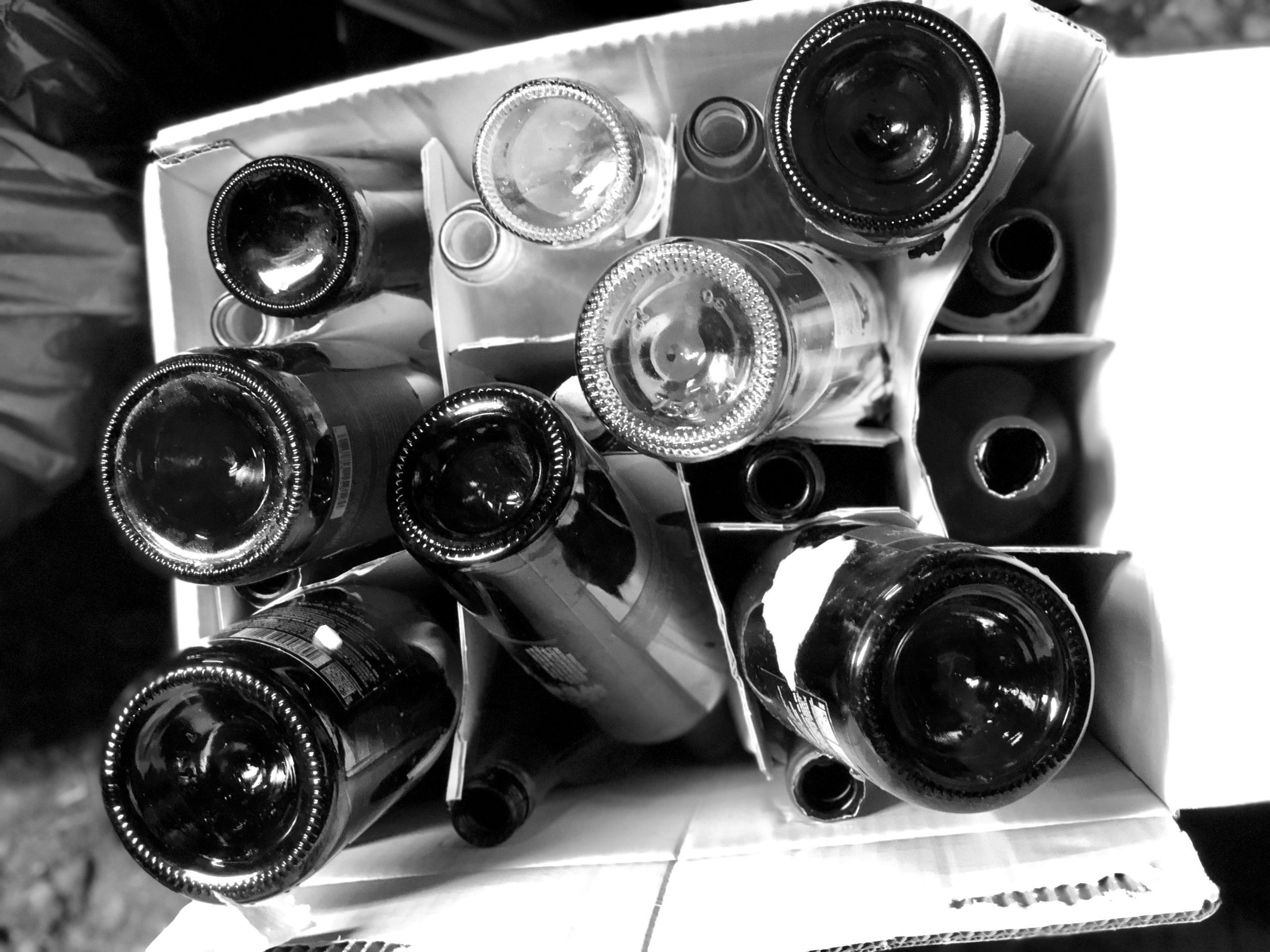
How to dispose of waste liquids in Engineering Building 6?

How do I get to Engineering Building 6?
Route from the South Gate:
Enter the campus from the South Gate, go straight until you reach a T-intersection, then turn left. Continue along the road downhill; Engineering Building 6 will be on the right, with a parking lot on the left.
Route from the North Gate:
Enter the campus from the North Gate, turn right at the first intersection, and go straight to the end of the road. After passing the 7-11 and the swimming pool, turn left. Continue along the road past the volleyball and basketball courts; Engineering Building 6 will be located across from the parking lot.

Where is the class location?
Engineering Building 6 (EF):
The main courses are the advisor's office hours and Introduction to Materials. This building is the exclusive teaching building for the Department of Materials Science and Engineering. It is closest to Dormitory 12, making it very convenient for male students in the department.
Science Building 1 (SA):
This building mainly offers courses in physics, calculus, and physics experiments. It is the department building for the Department of Applied Mathematics. The exterior looks somewhat old, but the classrooms are still kept clean and tidy.
Science Building 2 (SB):
It is the department building for the Department of Applied Chemistry, primarily used for chemistry laboratory courses. It is located across from Science Building 1 and is close to the campus's second cafeteria, making it convenient for students to go for meals after completing their experiments.
Science Building 3 (SC):
It is the department building for the Department of Electrical and Computer Engineering, offering courses in physics, chemistry, and calculus. Located adjacent to Science Building 1, the two buildings are separated by an open plaza. Science Building 3 is one of the newer buildings on campus, featuring modern design and a beautiful environment.
General Building 1 (A):
This building primarily offers general education courses and English classes. Although the building appears somewhat old, it is conveniently located near the Butter Kitchen and Dormitory 3, making it easy for students to dine after classes.

How can I find the professor's office?
How to find the professor's office location:
You can find the professor's office location through the school's course registration website. The specific steps are as follows:
- Open incognito mode and log in to the campus single sign-on portal.
- After entering the "General Course Registration System," click on "Course Planning."
- Plan the required courses, click on the selected class, and enter the "Course Syllabus."
- Click on "Faculty-Student Consultation" to find the professor's office location.
If you have already selected the course, you can also check through the E3 website:
- Log in to the campus single sign-on portal and enter the "E3 Digital Education Platform."
- After selecting the enrolled course, find "Course Syllabus" in the left sidebar.
- Click on "Faculty-Student Consultation" to find the professor's office location.
Meaning of the code:
After checking the professor's office location, you will see two letters followed by three digits. The first two letters represent the building (e.g., SB for Science Building 2). The first digit indicates the floor, and the last two digits represent the specific room number on that floor. After finding this information, please make an appointment with the professor in advance for the meeting time.
Common course codes for the Department of Materials Science and Engineering:
- SA: Science Building 1
- SB: Science Building 2
- SC: Science Building 3
- EA: Engineering Building 1
- EB: Engineering Building 2
- EC: Engineering Building 3
- ED: Engineering Building 4
- EE: Engineering Building 5
- EF: Engineering Building 6
- A: General Building 1
Laboratory location:
Currently, the General Physics Laboratory is located in the basement of Science Building 1 (SA), while the General Chemistry Laboratory is in the basement of Science Building 2 (SB). Laboratory locations may be adjusted in the future, so please stay updated by checking the notifications sent by the teaching assistants for the latest lab location information.

How to apply for an access card for Engineering Building 6?
Eligibility: Non-Materials Science students of this university
- Please visit the Department of Materials Science website to download the "Non-affiliated Access Application Form," or obtain it in person from Ms. Chen at Engineering Building 6 (Room EF110).
- After filling out the application form, it must be signed by your advisor or the equipment manager. Once completed, submit the hard copy of the application form.
Eligibility: Non-university students
- Please visit the Department of Materials Science website to download the "Non-affiliated Access Application Form," or go to Engineering Building 6 (Room EF110) to obtain it from Ms. Chen.
- After filling out the application form, have it signed by your advisor or the equipment manager, and then submit the hard copy of the application form.
- Choose one of the following methods to complete the application:
- Method 1: Submit a deposit of 500 NTD along with the application form, and the applicant will receive a "temporary card."
- Method 2: If you have an EasyCard or iPass, you can swipe it at any access card reader in the building, and fill in the swipe date and time in the blank space on the application form. This method does not require a deposit, but the application form must still be submitted.
- The access application is valid for one year. If an extension is needed, please resubmit the application form.

Where is a good place to study?
National Chiao Tung University Library
The National Chiao Tung University Library offers various study spaces, including the Multi-Purpose Learning Area on the second floor, reading areas on the fourth, fifth, and seventh floors, a multi-purpose learning space on the sixth floor, and research cubicles on the seventh floor.
- Advantages: Comfortable environment, spacious area, various study spaces, no mosquito disturbance.
- Disadvantages: Open hours only until 9 PM.
- Recommendation Rating: ★★★★★
24-hr study center
Located on B1 of the National Chiao Tung University Library, 24K is a 24-hour open space, perfect for students who need to study at any time. In addition, 24K is next to the Women's Dormitory 2 Restaurant, making it easy to buy food when you get tired of studying.
- Advantages: Close to the Women's Dormitory 2 Restaurant, large personal space, ample seating.
- Disadvantages: Lots of mosquitoes, loud sound when swiping cards to enter/exit.
- Recommendation Rating: ★★★★☆
Dormitory Study Center
Each floor of every dormitory has dedicated study spaces, ideal for studying during midterms and finals without disturbing roommates.
- Advantages: Close to the room, convenient for discussions, no need to tidy up or dress up to go out.
- Disadvantages: Limited seating, more severe mosquito issues.
- Recommendation Rating: ★★★☆☆
Department Study Area
Located on the second floor of Engineering Building 6, the Department Study Area (系K) is a dedicated study space for the Department of Materials Science. After renovation, the environment has become more comfortable, making it a popular spot during midterms and finals.
- Advantages: Close to the classroom, ample seating, not easily disturbed.
- Disadvantages: Lots of mosquitoes, narrow hallway.
- Recommendation Rating: ★★★☆☆
Dormitory 12 Social Lounge
After renovation, the Dormitory 12 Social Lounge has added four small private rooms, making it ideal for discussing reports or quiet study.
- Advantages: Comfortable environment, quiet, no mosquito disturbance.
- Disadvantages: Only four small private rooms available.
- Recommendation Rating: ★★★★☆
Hidden Corner of the Second Dining Hall
The study space located behind the Subway in the second dining hall is rarely noticed. It offers a quiet environment, but the internet signal is weak, making it unsuitable for activities that require an internet connection.
- Advantages: Few people, can conveniently grab a meal.
- Disadvantages: Limited seating, poor internet signal.
- Recommendation Rating: ★★★☆☆

What is GPA?
What is GPA?
GPA (Grade Point Average) is a system used to evaluate university students' academic performance, with scores ranging from 0.0 to 4.3.
Uses of GPA:
Applying for International Exchange Students
The higher the GPA, the greater the chance of being selected for an exchange program, with the possibility of receiving scholarship support.Applying for Graduate Schools (Domestic and International)
GPA plays a significant role in applications to universities and graduate schools abroad. U.S. graduate schools typically require a GPA of at least 3.0, with top-tier schools requiring 3.5 or higher. Domestic graduate school admissions also use GPA as a key evaluation criterion, reducing the pressure of entrance exams.Applying for Positions in Foreign Companies
GPA not only reflects a student's academic performance during their studies but also showcases the professional academic skills accumulated during their time at school.
How GPA is Calculated:
GPA = (Sum of Credits x Grade Points) ÷ Total Credits
Different Types of GPA:
- Overall GPA: The average grade of all subjects during the university period.
- Last 60 Credits GPA: Primarily the grades from junior and senior years. If fewer than 60 credits are completed, grades from the second semester of the sophomore year are included.
- Last Two Years GPA: The grades from the junior and senior years.
- Major GPA: Refers to the average grade of courses in the university major or the grades of elective courses related to the applied field of study.

How to apply for transcripts and enrollment certificates?
Students can choose one of the following two methods to apply for academic records based on their needs:
Application Method 1: Online Application System
- Application Steps: Please visit the Online Application Website and follow the instructions at the bottom of the webpage to complete the application process.
- Collection Methods: You can choose to have the documents mailed or collect them in person at the Registration Office with your ID after the specified processing days.
- Payment Process: Pay by credit card or ATM. Processing will begin only after the payment is completed.
Application Method 2: On-Campus Automatic Payment and Document Application Service System
- Application Steps: There are two self-service kiosks available on the Guangfu Campus, located at B1 of Science Building I (directly below the Registration Office) and on the 1st floor of the Technical Service Center, providing document application services.
- Machine Service Hours: Monday to Friday, 8:00 AM to 6:00 PM (excluding national holidays).
- Collection Method: Documents can be collected immediately after application.
- Payment Process: You can choose to pay by cash or mobile payment.
Important Notes:
- Academic Records: Only physical copies are available; electronic files cannot be provided.
- Transcripts: Transcripts include records of all past semesters. To apply for the current semester's transcript, please submit your application within the designated announcement period.
- English Certificate of Enrollment and English Transcript: Please present the receipt or your ID at the Registration Office during office hours to collect these documents.
- For more detailed information, please refer to the guidelines.

What are the ways to relieve stress?
In everyday life, everyone may encounter emotional distress. To help better cope with troubles, here are three practical methods for alleviating emotions.
**Method 1: Share Your Troubles with Someone**
When feeling upset, expressing or writing down your emotions can effectively alleviate mental stress. Try talking with family, friends, or roommates—they are usually more than willing to listen. The power of social support often exceeds our expectations. Everyone deserves kindness and care. Opening up and sharing your troubles can help release emotions and bring relief.
**Method 2: Explore Ways to Rest**
There are various ways to rest, and if you're unsure how to relax, you can draw inspiration from others. For instance, some people find solace in connecting with nature, while others reflect on life's vastness by stargazing. Additionally, immersing yourself in movies, anime, or novels can provide a temporary escape from sorrow. Experiment with different approaches to discover the method that suits you best.
**Method 3: Seek Assistance from Professional Organizations**
Seeking psychological counseling is not a sign of weakness; many people face emotional challenges, and those who courageously seek help deserve admiration. On-campus health and counseling centers offer professional services, providing support for issues such as relationship problems, mental health, anxiety, depression, and career guidance.
Psychological Counseling Center Information
- Location: 2nd Floor, Student Activity Center
- Website: Psychological Counseling Center
In addition to in-person appointments, students can also contact the center via email or phone. The Psychological Counseling Center has also compiled a list of nearby mental health clinics. If you or a friend need assistance, it is recommended to proactively reach out to the center so that professional counselors can help address the issues.

What is a buddy system?
Every new student can connect with their assigned senior mentor through the buddy system. These mentors serve as personal campus guides, helping freshmen better adapt to university life.
What is a buddy system?
A buddy refers to a senior student exclusively assigned to a freshman. They are experienced mentors in campus life, offering valuable insights and advice.
How can I find my buddy?
Each department's student association regularly organizes Buddy Meetups, where freshmen are paired with sophomores through a random process, such as a draw. These meetups not only facilitate buddy pairings but also include fun activities and late-night snacks, creating a relaxed environment for new students to get to know each other. It's a rare cross-year gathering that freshmen are highly encouraged to join.
The buddy system is like being part of a family.
The buddy system operates like a big family, with new students joining every year, forming a chain of mentors and mentees. This continuous influx of new members ensures that every freshman feels the warmth and support of a family on campus. Seniors guide the freshmen step by step, helping them integrate into campus life.
Dual Support for Academics and Social Life
Buddies are not only there to help freshmen with daily life issues, but many senior mentors are also willing to share study resources, such as past exam papers and report records, to assist their juniors in navigating academic challenges. Additionally, they regularly organize gatherings, such as family-style dinners, to foster relationships between different cohorts and share important information on further studies and employment opportunities, making them a valuable source of support.
The Importance of Interaction Etiquette
Freshmen should maintain politeness when interacting with their buddies, especially when meeting seniors they haven't encountered before. Being mindful of their attitude and fostering a relaxed atmosphere helps maintain good relationships. These connections will become valuable references in the future, whether in further studies or employment opportunities.

Where is the ATM located on the Guangfu campus?
There are several convenient ATMs located throughout the campus, making it easy for students to withdraw money at any time. Below are the main locations of the ATMs:
Second Restaurant
For students residing in Zhuxuan and dormitories 9, 10, and 11, the Second Restaurant is equipped with multiple ATMs for convenient withdrawals.
- Post Office
- China Trust Bank (located inside 7-11)
Chung Cheng Hall
As one of the key buildings on campus, Chung Cheng Hall frequently hosts important school ceremonies and serves as a symbol of the NYCU spirit. It is also equipped with ATM services for visitors.
- Post Office
- E.SUN COMMERCIAL BANK
Female Dormitory 2 Restaurant
The restaurant located beneath Female Dormitory 2 serves residents of Female Dormitory 2, but residents of Dormitories 7 and 8 can also conveniently use the ATM here.
- E.SUN COMMERCIAL BANK
- Taishin Bank(位於全家內)
General Building I
This is the place where many students take general education, English, or second language courses. It is located directly opposite Graduate Dormitory 3 and is equipped with the following ATMs:
- Post Office
- E.SUN COMMERCIAL BANK
Activity Center
The Dance Club and other students who need space for dance practice often gather here. The Activity Center is located behind the First Restaurant and is equipped with one ATM.
- Mega International Commercial Bank
7-11 in Dormitory 13
This independent 7-11 is located between Dormitory 13 and Graduate Dormitory 3, making it convenient for residents of Dormitories 12, 13, and Graduate Dormitory 3.
- China Trust Bank
For students under 20 years old, opening a postal account is the most convenient option. The post office at Chung Cheng Hall in the Guangfu campus offers in-person counter services from 8:30 AM to 5:00 PM on weekdays.

What sports facilities are available on the Guangfu campus?
The campus has multiple sports facilities, offering students a wide range of sports options. Below are the details of each facility:
1. Swimming Pool
Location: Next to the General Gymnasium, across from the Sports Hall
Facilities:
- Outdoor Swimming Pool
- Indoor Swimming Pool
- Second Floor Fitness Center
Opening Hours:
Due to the impact of the pandemic, the swimming pool's hours have been adjusted. It is recommended that students check the latest announcements from the Sports Office before heading there.
-
Outdoor Swimming Pool:
- Monday, Wednesday, Thursday: 07:00–10:00, 15:00–20:00
- Tuesday: 07:00–20:00
- Friday: 07:00–12:00, 15:00–20:00
-
Indoor Swimming Pool:
- Monday to Friday: 14:00–22:00
- Weekends: 09:00–12:00, 13:00–18:00
-
Second Floor Fitness Center:
- Monday to Friday: 07:00–12:00, 13:00–22:00
- Weekends: 09:00–12:00, 13:00–22:00
Admission Guidelines: :
- Outdoor Swimming PoolFree Admission
- Indoor Swimming Pool:每次40元,禁止穿鞋入內
- Second Floor Fitness Center:Free admission, must bring student ID and a towel.
2. Sports Hall
Location: In front of the playground, directly opposite the swimming pool
Facilities: Basketball court, volleyball court, fitness training room, aerobics room, weight training room, martial arts room, sports office
Opening Hours: :
- Monday to Friday: 08:00–23:00
- Saturday and Sunday: Closed
Weight Training Room Opening Hours::
- Monday to Wednesday: 17:00-22:00
- Thursday: 17:10-22:00
Admission Guidelines: Free Admission
Important Reminder: Please take care of the wooden floors in the Sports Hall.
3. General Gymnasium
位置:操場和游泳館旁
館內設施:
- B1: Badminton Court
- 1F: Table Tennis Court
- 2F: Tennis Court
Opening Hours: Monday to Sunday: 08:00–23:00
Admission Guidelines: Open to both internal and external individuals. Please check if the facility is reserved for the school team before entering.
4. East District Badminton Court
位置:光復校區東北邊,在東區球場中
館內設施:館內設有五個羽球場
Opening Hours: Monday to Sunday: 08:00–23:00
Admission Guidelines: :進入館內需攜帶學生證。防疫期間人數上限為30人,需實名登錄進入。
This concludes the introduction to the sports facilities. We hope this provides you with a deeper understanding of the school's sports venues. For the latest announcements, please refer to the NYCU Sports Office website.

如何領宅配包裹及掛號?
National Yang Ming Chiao Tung University offers students convenient parcel and registered mail collection services. Below are the detailed instructions:
1. Home Delivery Packages
Dormitory managers in each area can assist students in the dorms with receiving packages on their behalf.
Collection Method:
- Students must bring their student ID to the dormitory manager's office to collect their packages.
- Address Requirements: The dormitory campus and room number must be clearly indicated to assist the manager in verifying the information. For example: 1001 University Road, East District, Hsinchu City, NYCU, Dormitory XX (Area X), Room XXX
2. Registered Mail Collection
Students can collect registered mail from the Documentation Office (located on the first floor of the Grand Auditorium) Monday to Friday, from 08:00 AM to 05:00 PM, by presenting their student ID. They may also authorize someone else to collect the mail on their behalf, but the student ID must be handed over to the authorized person, who must bring their own student ID for verification.
Important Notes:
- Registered mail sent to the dormitory will be notified by the dormitory manager.
- If the mail is sent to a department, the dormitory managers must go to the Documentation Office to collect and forward it.
- After the daily registered mail registration process is completed, the Documentation Office will send an email notification to inform recipients to collect their mail (an account must be created in the NYCU system first). You can also check the mail status on the Documentation Office website: Registered Mail Inquiry.
- Foreign mail that does not clearly specify the department or dormitory will be posted on the Documentation Office website under the "English Mail Collection" section.
- If the registered mail is not collected within 15 days, it will be returned to the sender for further processing.
If you have any questions, students can refer to the following detailed brochure for further clarification: Detailed Brochure

如何借工六教室?
To facilitate the borrowing of classrooms in Engineering Building 6 at National Yang Ming Chiao Tung University, below are the detailed procedures and important notes:
Classroom Reservation Process:
- Log in to the campus single portal and access the Classroom Reservation System (NCTU Campus).
- Add classroom reservation details and confirm.
- Select the desired date and time slot for reservation and confirm.
- Select the classroom you wish to reserve.
- Print the Classroom Reservation Application Form for the Engineering Building 6 of the Department of Materials Science.
- Fill out the application form and obtain the department chair's signature.
- Submit the completed application form to the department office.
Classroom Reservation Guidelines:
Available Classrooms: Currently, the classrooms in Engineering Building 6 include:
- EF201 (approximately 81 seats)
- EF202 (approximately 51 seats)
- EF205 (approximately 65 seats)
- EF207 (approximately 867seats)
Usage Categories:
- (1) Teaching Purposes: Includes undergraduate, master's, and doctoral courses and events organized by the department, special programs of the College of Engineering, and student activities organized by the departmental student association.
- (2) Non-Teaching Purposes: Not available for lending to clubs, camps, or other departments due to noise concerns and management factors.
Borrowing Restrictions: Reservations are limited to teaching courses and events organized by the department. If borrowing is required during unallocated time slots, applications must be submitted no earlier than one month before use, along with proof of relevant personnel insurance. Approval from the supervisor of the borrowing unit is required before use.
Department Student Association Reservations: The Department Student Association must pay a deposit of 1,000 NTD for classroom reservations. The deposit will be refunded upon department approval if the classroom facilities are restored according to regulations after the event, with no damages or losses to public property.
Key Management: Borrowers must collect the key from the department office during office hours and return it after use. Borrowers should strictly adhere to the usage period. Failure to return the key on time, thereby affecting others' rights to use the facility, will result in suspension of future borrowing privileges.
Restoration Responsibility: After using the classroom, borrowers must restore desks and chairs to their original positions, turn off lights and air conditioning, and return the key. If improper use results in damage to or loss of public property, the borrower will be responsible for compensation or repair.
Classroom Reservation Application Form and Guidelines Link: View Details

如何借用四樓大學部實驗室儀器?
To ensure the proper use of laboratories and shared departmental instruments, the following are the borrowing procedures and guidelines:
Borrowing Procedures:
- When borrowing laboratories or shared departmental instruments, permission must be obtained from the professor or the teaching assistant managing the equipment.
- Given that improper or unfamiliar operation of instruments may cause damage, and to ensure user safety, necessary training and assessment must be completed before borrowing instruments.
- After passing the qualification exam, borrowers must schedule a usage time with the teaching assistant and use the instrument within the reserved time slot.
Borrowing Restrictions:
- Undergraduate students are not permitted to borrow fourth-floor undergraduate instruments except for special needs.
- Teaching assistants and graduate students are allowed to borrow instruments.
Instrument Types and Locations:
- FT Rockwell Hardness Tester: Room 409, Engineering Building 6
- Precision Experimental Furnace: Room 410, Engineering Building 6
- Impact Testing Machine: Room 412, Engineering Building 6
- Universal Testing Machine: Room 412, Engineering Building 6

工六廢液如何回收?
Waste Liquid Disposal Process:
Segregated Collection: After experiments, all waste liquids will be classified by type, including heavy metals, chlorinated organics, non-chlorinated organics, acids, and bases. They will be centrally stored in 20-liter plastic waste containers (HDPE material).
Centralized Storage: When the volume of waste liquid generated by experiments is excessive or the laboratory's waste liquid storage capacity is exceeded, the waste will be temporarily centralized in the "Waste Liquid Storage Room" (EF706) on the 7th floor of Engineering Building 6. It will then be handed over to professional contractors for disposal at designated times.
Waste Liquid Collection Schedule:
- Approximately every three months, professional contractors will collect and process the waste.
Waste Liquid Collection Location:
- All waste liquid will be centralized at the outdoor "Loading Dock" on the second floor of Engineering Building 6 (near the baseball field) and handed over to professional contractors for disposal.

